Weekly Writing Summary For The Week Ending 06/19/2025

Sébastien Leclerc:
Gelijkheid van dagen en nachten tijdens zonnewende
[Equality of days and nights during solstice] (1706)
Might Be One Day
I suppose I'm not supposed to understand why anyone might choose not to dedicate themselves to encouraging domestic tranquility. This world remains no less beautiful than its potential ever promised, yet some seem to flee from every opportunity to take it easy, to make it easier. I've been writing about our incumbent, a person who never didn't have a couple of screws loose, as if he might one day catch on and start trying to catch up, but I acknowledge he's incapable; supremely incapable, as I might also be.
The tragedy remains that it could still be as it could and should be, but we reject those possibilities, and I suppose we reject the opportunities we receive as poorly-timed or otherwise not quite right.
FollowingChapters

Sebald Beham: Prodigal Son Keeping his Swine (1538)
" … wherever they might lead."
By my count, I will be finishing my thirty-second series this week. I began writing these during a period of professional despair, when I wondered if I was or ever had been a writer. I figured that if I was a writer, I could damned well write, so I set about writing an essay every morning. By the end of the first quarter, I'd produced a book-length work. I continued the exercise, perhaps only a tad bit more convinced that I might be a writer after all. Now, the end of eight years later, I find myself finishing my thirty-second such series. Honestly, I cannot quickly even list the names of all of them in sequence. As usual, software problems, by which I probably mean 'user difficulties,' have resulted in a small black hole in 2022, so that I've temporarily lost access to a few quarters' stories. Nothing I can't recover with considerable frustrating effort.
As I've neared each ending, I've started questioning what I should be doing next.
TheAmericanDisease

Frederic Edwin Church: Our Banner in the Sky (1861)
Gallery Text:
Within this vibrant scene of atmospheric flux, an opening within a roiling cloud layer reveals stars against a blue firmament. The barren tree in the foreground doubles as a pole for this celestial apparition of the “broad stripes and bright stars” of the U.S. flag. Following the rapid succession of political provocations that led to Confederate forces firing on Fort Sumter, Church channeled his belief in the divine righteousness of the Union cause into this patriotic visual spectacle.
As the sectarian conflict stretched from weeks into months, the oil sketch, with its allegorical river valley resembling the Catskills and the Hudson River, was translated into a popular chromolithograph. The prints were issued by the New York branch of Goupil & Cie as a subscription fundraiser to support the families of Union soldiers. This is one of the few lithographs from the series that Church painted by hand.
— —
"We live with our thumbs on the scale."
Something ails us. Something has always ailed us, back to our earliest aspirations. We firmly believed ourselves to be blessed beyond all others. We were seldom humbled in acknowledgement. We took possession and became possessed. Perhaps it was the blessing that possessed us to behave not as if we deserved the blessing but as if we were owed it.
Our original sin was greater than many others.
LostOn

Albert Sterner: Lost Angel (1932)
" … to keep myself company while I watched my potency and influence evaporate."
Almost in retrospect now, I perceive that much of the material I produced in this series would have been LostOn our incumbent, who seems especially resistant to much beyond relatively mindless memes. Of course, it's always been the case that those anyone feels really need specific information, prove incapable of absorbing its meaning. This difficulty has troubled geniuses as well as idiots, and might well serve as the ultimate dilemma. It might be that anything undertaken expressly for another's good proves incapable of delivering that result. Sarcasm holds an especially special place in this particular pantheon, for it, above all other literary forms, proves least likely for the one needing its message to receive it. A boss once confided to me that there is no place in business for sarcasm. It might be that there's really no place in this world that's safe for it, either.
But then, sarcasm might be a gift only its author can ever receive.
Slander&Libel
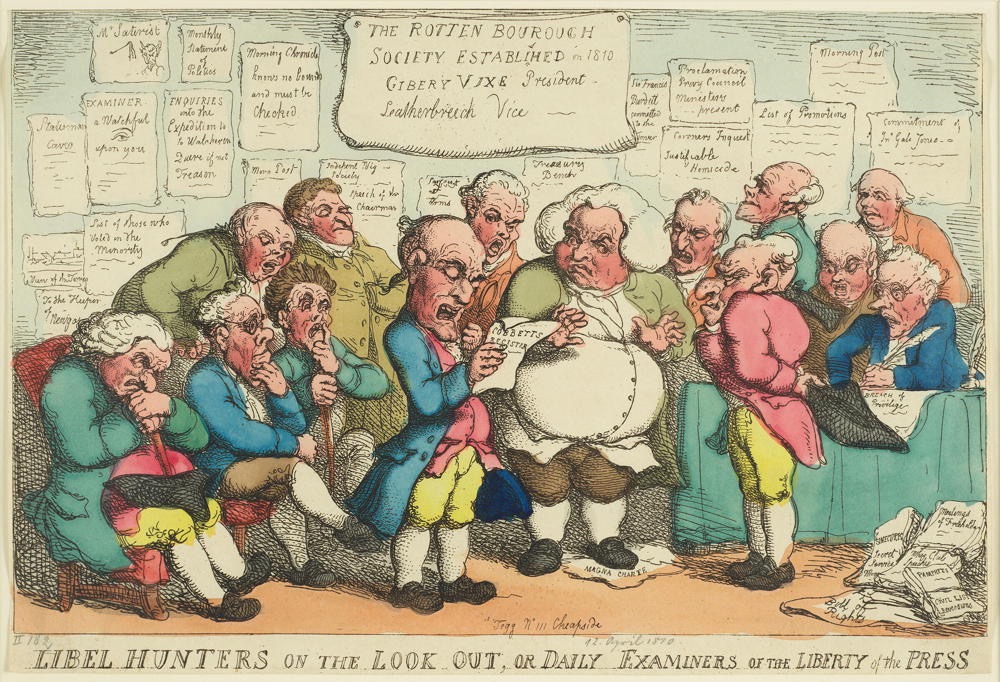
Thomas Rowlandson: Libel Hunters on the Look Out,
or Daily Examiners of the Liberty of the Press
Series/Book Title: Tegg's Caricatures
Published by Thomas Tegg (April 12, 1810)
"I've been Coping by averting my gaze and Hoping for better …"
With what have I been so actively Hoping for and Coping with through this series? Aside from the frequently malign attempts at misadministration, the mischaracterization of virtually everything has been haunting me most. During his first term, we had almost grown accustomed to the ever-growing lists of untruths produced by him and his team. It seemed that nothing ever crossing those lips came close to any truth, let alone the whole or anything but. It seemed more like the perennially partial and everything but the truth from that machine. They seemed inherently disagreeable. No sky could be characterized as blue but what one of his supporters would get their nose all out of joint to argue about the actual color, which was essentially always clearly some shade of blue. The pickier the complaint, the more weight it seemed to carry. The effort seemed primarily focused on discrediting anyone of decent character. We stopped wondering how low they might go because they always went even lower than that in their attempts to … what? Bolster their boss's delicate ego?
It becomes curiously frustrating when I know for sure that someone is lying to me. It's not that I cannot see right through each fresh fiction.
Fizzled

Henri Matisse: Woman before an Aquarium (1921–23)
Gallery Notes: In the first two decades of the 20th century, Henri Matisse visited exhibitions of Islamic art and traveled to Algeria and Morocco, where he collected pottery, textiles, and tiles. Years later, while living in Nice, France, Matisse reflected on these experiences, integrating visual elements he encountered, such as the patterned textile screen, into his paintings. In Woman before an Aquarium, the carefully subdued decorative pattern of the screen contributes to the psychologically rich, contemplative mood of this interior scene.
"Happy birthday to us, they cheered, ignoring the irrelevant incumbent."
For all of the existential dread that fueled so much of this series, little damage has resulted. Yes, calamities ensued, but very little was likely to last even to the impeachment, for he uniformly chose poorly both in terms of objectives and executors. The incompetence seemed simultaneously stunning and unsurprising, for even those not closely watching his first so-called administration understood that he had never been anybody's administrator. Gifted solely in self-promotion, none of his many promises ever came to pass.
He spawned more legal actions than anything else, and he succeeded with very few defenses except to delay what everyone always understood would not be victories.
CHoping

Pieter Bruegel, the Elder: Hope (c. 1559)
" … an obscure, long-neglected corner of the garden."
Difficult times seem to demand some definitive response, but I often feel stymied in those contexts. If I felt more empowered, I might respond more immediately, but difficult times seem especially designed to take away my authority to act. They seem to leave me with few options beyond humiliating acquiescence. I stumbled upon two unlikely superpowers, though, that, when combined, seemed to give back much of my authority to act, however unlikely these separately seem capable of reversing humiliation: Hoping and Coping. I combined these into another one of my words that annoy the spell checker: CHope. I might have better employed the gerund form, though, because these require activity to make any difference. I have been actively practicing CHoping rather than merely embodying CHope over these past nearly three months.
It doesn't matter whether I start by hoping or by coping, though starting with hoping seems the more logical departure point.
Weekly Writing Summary For The Week Ending 06/12/2025

Benoît-Louis Prévost:
Design: Legs and Feet, from Encyclopédie (1762/77)
Summer Seems Uninfluencable, Inexorable
July arrived in early June this year, bringing with it all the usual seasonal concerns. I have to relearn my coping strategies every year, for I never seem to retain their details. I lose a rhythm I must regain, like the understanding that outside work must be completed by noon or I suffer consequences. The basement stays at the same wine-cellar temperature year-round. The windows open at bedtime, before closing us in again before ten the following morning. The sounds of ceiling fans remain a constant companion. If I forget to close the window shade in front of my desk, the late afternoon sun will bake my desktop. The watering schedule seems sacred. The backyard pond finally appears to be clearing. The goldfish perform an appreciative ballet when I feed them in the late afternoon, as shadows overtake our backyard refuge. The first fires began blackening our parched landscape, and everyone seems on edge, welcoming while also dreading our most dangerous season. I can huddle through Winter and reason with Spring, but Summer seems uninfluencible, inexorable.
Un-American
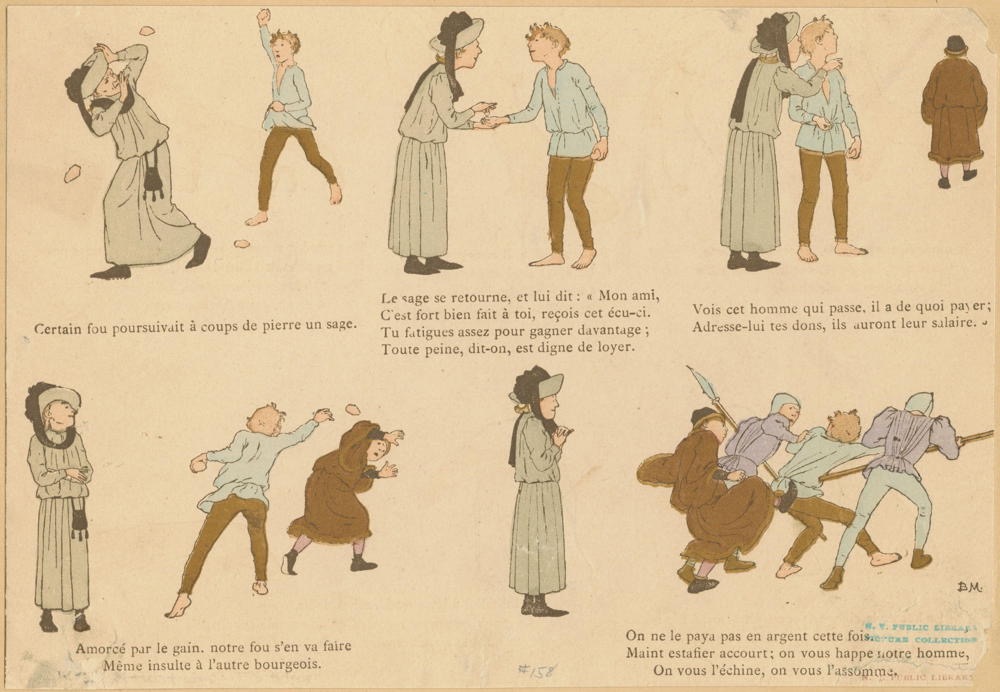
Boutet de Monvel: Un fou et un sage [A fool and a wise man] (1888)
"He might be the most significant land mass to hold office since Grover Cleveland left office."
I have a confession to make. I understand that our incumbent has been talking about arresting those who would criticize him and his [Administration]. (I was forced to place the word [Administration] within braces because the best evidence demonstrates that he and his cronies have yet to successfully administer anything.) I understand that, according to him and his minions, it should be a crime to take their lord's name in vain. I hereby publicly admit that I have committed this heinous act on more than one occasion, and often with evident satisfaction. Further, I've overtly encouraged others to do the same, sometimes even engaging in something akin to "Playing The Dozens", even resorting to gleefully engaging in bouts of The Dirty Dozens. Instead of "Yo Mama So Fat That … " I said, "Yo President So Fat That …". What's the prescribed punishment?
I'm old enough to remember when The American Way included what was then referred to as The Loyal Opposition, where our Justice Department would have never contemplated filing charges against any citizen accused of defaming any elected official, warranted or not.
Slurtenty

Ferdinand-Victor-Eugène Delacroix:
A Turk Surrenders to a Greek Horseman (1856)
Gallery Text
In the mid-1850s, Delacroix returned to themes he had treated thirty years earlier, though with an important difference. Rather than carefully distinguish literary from historical and topical subjects, he conflated them, as in this instance. Here, he draws on Byron’s description of the giaour (a Turkish slur for non-Muslims) overcoming the Turkish pasha in his poem “The Giaour, a Fragment of a Turkish Tale” (1813). To a contemporary audience, the composition could have appeared to be an episode from the Greek War of Independence (1821–32), a romantic cause célèbre that had inspired two of Delacroix’s large canvases of the 1820s. The result is a nostalgic invention that appealed to mid-century French orientalist fantasies.
"We seem the most curious crown of creation imaginable."
People often accuse me of "not getting with the program." I do not feel all that plugged in. Others seem to have access to resources I never imagined existed. One might proclaim that we might never recover from our incumbent's inept non-administration, and I usually feel the need to ask them how they know, for I can't sense a source of information that might lead anyone to conclude anything with such certainty. I usually receive some litany of evidence that doesn't quite add up to proof by my accounting, and typically leave the encounter at that. I, convinced they were talking out of their hat, and they with their confidence bolstered, neither of us any wiser.
People seem to react to uncertainties by becoming overly confident about something nobody can ever be sure about.
Paradoxysm
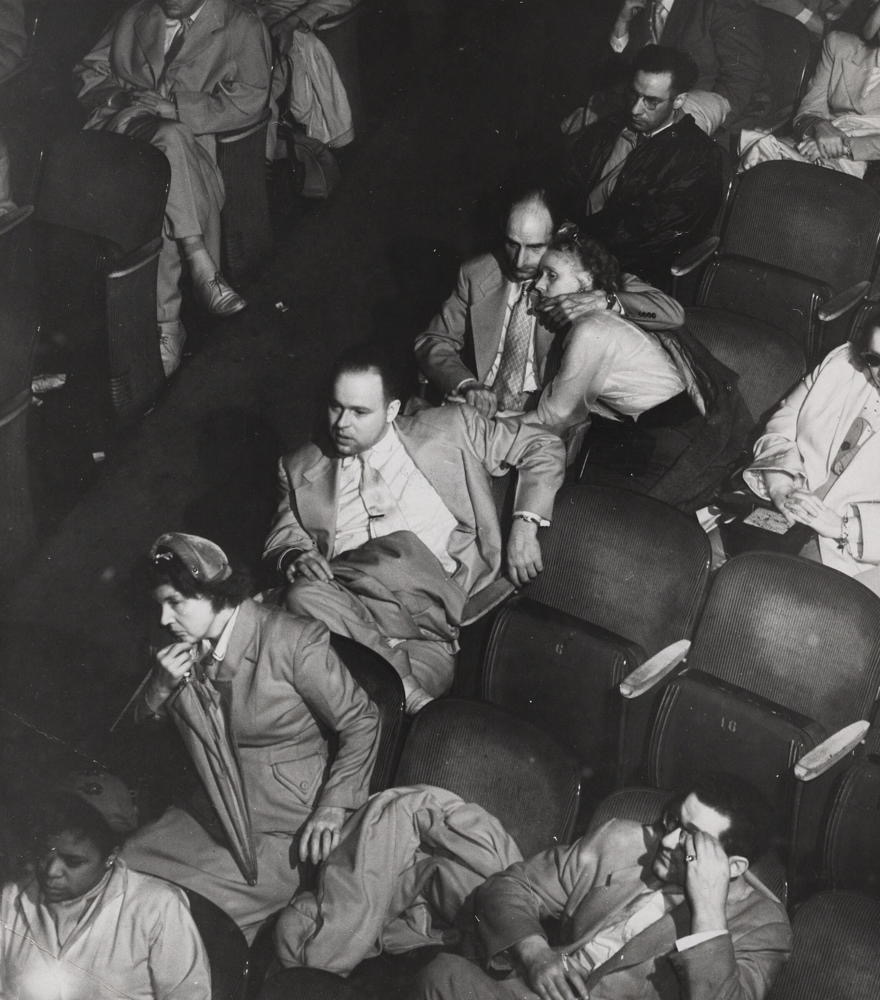
Weegee (Arthur Fellig): Audience Reaction (c. 1940 - c. 1950)
" … get over the idea that they'd never get another decent shave …"
Our incumbent fulfills his responsibilities under our Constitution by not fulfilling his duties under our Constitution, and has steadfastly done so since the first few seconds after solemnly swearing to, you know, fulfill his responsibilities under our Constitution, thereby joining the ever-popular cast of Zeno's favorites, right next to the barber who famously shaved everyone in town who didn't shave themselves. Who shaves that barber, Zeno wondered? He quickly realized that he'd asked a Fundamentally Unanswerable Question, commonly referred to as a FUQ. Those who routinely hand out FUQs by either speech or action tend to gum up the operation of whatever system they find themselves embedded within. The critical judgment ordinarily necessary to avoid introducing errors into systems tends to become muddled when confronting one of Zeno's insidious paradoxes. What might otherwise seem straightforward becomes essentially unresolvable.
After the conventionally unanswerable questions get asked, only to remain annoyingly unanswered, litigation understandably follows.
Opposition

Hendrick ter Brugghen (signed by artist) (1628)
Heraclitus
Gallery Notes: The Greek sage Heraclitus was known as the crying philosopher because he mourned the folly of humankind, while his opposite, Democritus (the nearby pendant), could only laugh at it. Here, Heraclitus looks like a melancholy old man. Downcast, he leans on a terrestrial globe and gestures dismissively with his left hand, as if to say: ‘All is for nought, the world will come to nothing.’

Hendrick ter Brugghen (signed by artist) (1628)
Democritus
The Greek philosophers Democritus and Heraclitus were considered to be polar opposites. In contrast to the old, melancholy Heraclitus (the nearby pendant), Democritus appears as a young, laughing hedonist. He points to the distance, as though that is where the folly of mankind is found. Together, the pair of paintings conveys a moralizing message: whether you laugh or cry, the world remains incurably foolish.
" … when we're not watching closely enough to notice."
I rarely acknowledge how steadfastly I oppose my actions. If a loyal Opposition exists, I embody it. I hesitate when I might charge. I likewise usually fail to notice how effectively everyone around me works to undermine themselves, too. It's as if we each possess a gyroscope spinning somewhere inside that tries to keep balance by introducing opposing forces into our efforts. On my better days, I feel fully capable of acknowledging these forces, and even that they sometimes seem to manage to eventually produce the opposite of whatever it was I claimed to be pursuing. The Ancient Greek Philosopher Heraclitus insisted that things inevitably become their opposite, as if this was as normal an attribute as height or weight. This trait need not necessarily spark concern. I take considerable solace in acknowledging that our incumbent must be prey to precisely this same force of nature.
I suspect he's unaware that he represents his own, most effective opposition.
FalseBelief

Albrecht Dürer: Justice, Truth, and the Future
in the Stocks before the False Judge (1526)
"These performances exhaust everyone involved."
Nobody can successfully argue that democracy isn't inefficient, but then those who argue for efficient government might misunderstand government's deeper purpose. What should justice cost? What overhead does injustice inexorably extract? Should we simply avoid engaging as a society in inherently inefficient activities that do not properly scale, like education and medicine? Should we always expect some return on our investments in governance, or are some sunk expenses, table stakes extracted as the inescapable price of engaging in governing at all?
My forebears here in the Valley They Liked So Well They Named It Twice built a grand county courthouse back near the beginning of the prior century. They raised their own taxes to accomplish this and accepted private donations from grateful immigrants. It still stands there, being remodeled and updated at considerable cost today. When we needed to expand a few of the county offices, a bankrupt bank's building was purchased rather than raise taxes to build another edifice for the ages. Which building better represents a deep respect for the institution, the wedding cake building or the more modern one? Which one might elicit pride as you enter to conduct your business, and which might evoke the sense that you're engaging in a commercial transaction rather than an essential social interaction? There are good reasons why churches traditionally build inspiring edifices for the ages.
And what of the heretics, those who cannot seem to get with the program? For the authoritarian, the heretic presents a special sort of dilemma. A leader can demand fealty but not belief, for demanded belief seems different. One can go through the motions without convincing anyone, especially themself, that they represent a true believer, and authoritarians demand, above and before all else, true belief. Loyalty tests might ensue should any questionable behavior show through, and try as one might, nobody can successfully pantomime the genuflections of any true believer unless, of course, they hold true belief. Demanding true belief presents a paradox to all but the true believer. If belief requires volition, it's provably false. Only those who truly love God get into heaven, or so the doctrine insists. Mimicking rituals doesn't quite cut it.
My son believes that my father's family might have been coerced into catholicism back in the seventeenth century. The pope at that time required everyone to take a surname if they didn't already have one, for the underlying purpose of tax administration. All those Benny the Candlemakers would have to adopt a formal name. Some chose Candlemaker while others chose Gross or Schmaltz, to reflect that their profession essentially entailed collecting unused fat and rendering it into candles. The chosen name would have to be called out in the town square by the tax collector, and those who chose Gross or Schmaltz as their surname would force the collector to call out words that were then embarrassing to proclaim. However, they were more than just early tax protesters. Some were Jews who had been coerced into practicing catholicism. The first Holy Roman Emperor, Charlemagne, a distant grandfather of mine, earned his designation by coercing heathens into the church, often at the point of a sword. It might be true that most catholics were initially forced into their faith, though over subsequent generations, many grew into more willing observance.
FalseBelief has never been uncommon. Every culture frowns upon some behavior or practice, and some within each culture get born sideways to the prevailing ways. The authoritarian always insists that their gays choose to be perverts, but the perversion originates in the rules for exclusion adopted by those in charge. They issue Be Spontaneous Paradoxes, demanding that true believers demonstrate their faith with their behaviors because they want to. Those who violate these edicts either overtly or because they cannot successfully mimic a faith they do not possess, whether through defiance or nature, become the enemy from within, and their presence cannot be countenanced. Furthermore, it has always been the case that any decent authoritarian creates a cadre of those they know for certain can't comply with their demands. These became his handy heretics who can be punished to demonstrate what happens when someone defies his divinely inspired authority.
The continued insistence finally encourages FalseBelief, even and especially among the formerly truer believers. The premise upon which their faith relied could not maintain itself in practice. The authorities cannot hold the FalseBeliever in check any more than the FalseBelievers can continue pretending to want to believe. These performances exhaust everyone involved. As Bonnie Raitt said, “I can't make you love me if you don't. I can't make your heart feel something it won't." © 1991 by Universal Music - Mgb Songs, Almo Music Corp., Brio Blues Music
©2025 by David A. Schmaltz - all rights reserved
Ideological

Henry Inman: [Tah-Col-o-Quoit (Rising Cloud)],
Asakiwaki/Sauk Warrior;
representative of the Sauk and Fox coalition
Former Title: [Tah (sha)-col-o-quoit], Sauk and Fox Delegate
(c. 1832-1834)
" … promising greatness as if from the mouth of God."
Perhaps the primary difference between what most of us might recognize as regular order and the MAGA World manifesting before us might be best acknowledged as the fundamental difference between policy-driven and ideology-driven governance. Policy-driven governance relies on agreements negotiated between often opposing viewpoints, as embodied in the 'Out of Many, One' notion, codified as the official motto of this nation. This characterization deftly encapsulates democracy in practice. It's naturally full of contention but also well-practiced as resolution. For every disagreement, some compromise might exist, and the primary purpose of self-governance must be to find these and agree to live within them. Absolutism cannot coexist within democracy's inherent pluralism. There's right, wrong, and left: right or wrong, what matters might always be whatever's left after the passionate argument.
What's left is policy, a statement of agreement intended to transcend right and wrong.
Weekly Writing Summary For The Week Ending 06/05/2025
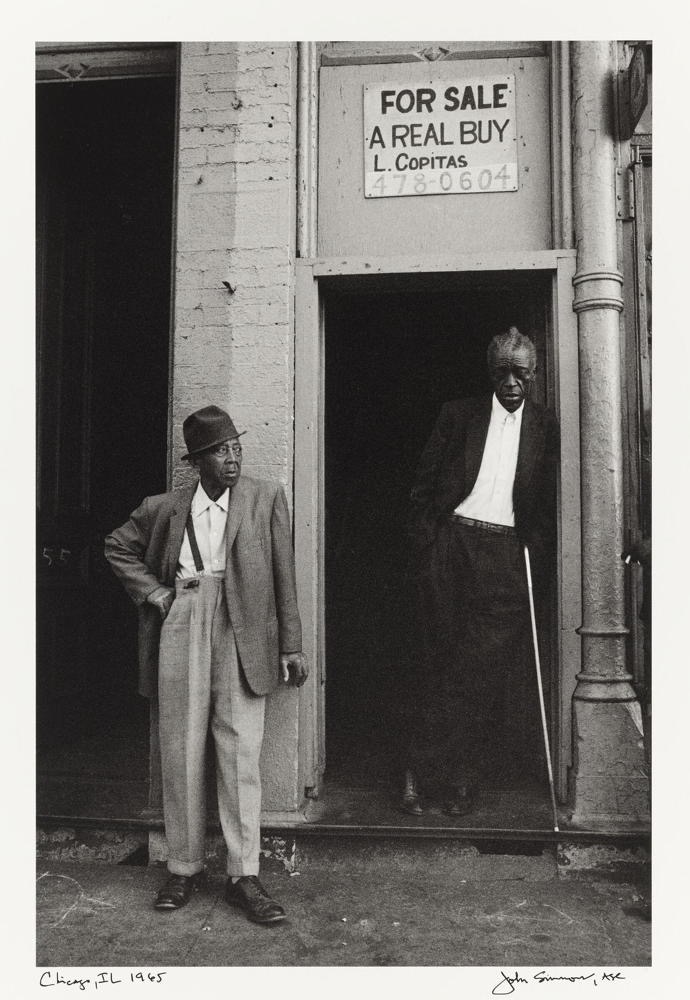
John Simmons: Man With A Pistol, Chicago (1965)
My Aches and Pains
Aging turns out to work differently than I'd imagined. I thought wisdom might visit, but so far, it hasn't. I see my contemporaries generally acting more foolish, which doesn't come as much of a surprise. Disease has ravaged many, and this wasn't unexpected, except I expected some justice to be represented in those it chose. It hasn't. It might be an illusion, but the innocent seem more vulnerable than any reasonable supreme being would have deigned. The cost of aging gets exacted in aches and pains, which ultimately seem inescapable. The meaning of those gets transposed into indicators of well-being. In our youth, well-being was gauged by the absence of aches and pains. Now, I can tell I'm well by their presence. They seem to be there not so much as an alarm or caution, but to reassure me. When my hands ache, they remind me of what I accomplished the day before. I dare not waste my precious remaining time chasing cures for these indicators, for what was once evidence of illness has become the very soul of my wellness. I have become my aches and pains.
SmallExtraordinaries
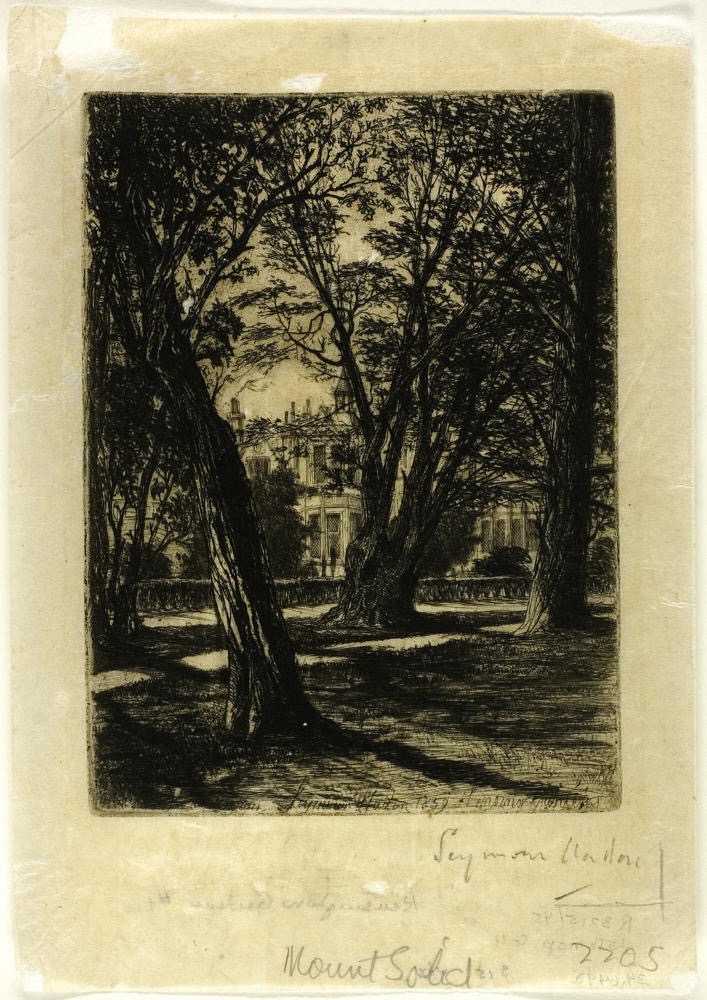
Francis Seymour Haden: Kensington Gardens, No. I (small plate) (1859)
" … bound as well as determined to drag itself through Hell again."
As our world continues to draw itself ever closer to Hell, I am gaining a renewed appreciation for SmallExtraordinaries. These tend to be tiny and easily overlooked. In most circumstances, I overlook these and never even notice my omission. In ordinary times, these go unappreciated because the foreground tends to consume the bulk of attention. When, as now, I find myself suddenly living in truly interesting times, I tend to need to avert my eyes. I understand the inexorable momentum of every slow-moving train crashing. I've seen that movie too many times and require no reinforcement to better recall the resulting calamity. I tend to become a little obsessive, as if obsessive ever comes in little sizes. I can become consumed with the resonance of demons and devils when civilization seems determined to run itself through Hell again.
I require respite now, and I have been finding it in SmallExtraordinaries.
EncroachingIrrelevance

Unknown Artist: Picture (17th century)
"Such always was the way with this world."
Purpose often appears quite independent of anyone's intention. It might show after considerable effort. Whether that effort seems a success or a failure might not matter, for every system discloses its purpose through its product. The meaning of the effort appears in whatever that effort produced, however it might be judged. Many naive notions crumble beneath humbling realizations. Nobody's life turns out to be a smooth upward progression where one inevitably learns better to yield ever-increasing rewards. No, we each experience setbacks and thrusts forward, some of which, seemingly inevitably, sum to something different than we thought we had invested. Any serious search for anything occasionally results in producing its opposite; even the Ancient Greeks understood this.
Not one of us could possibly be exempted from this calculus.
BillionHerecy
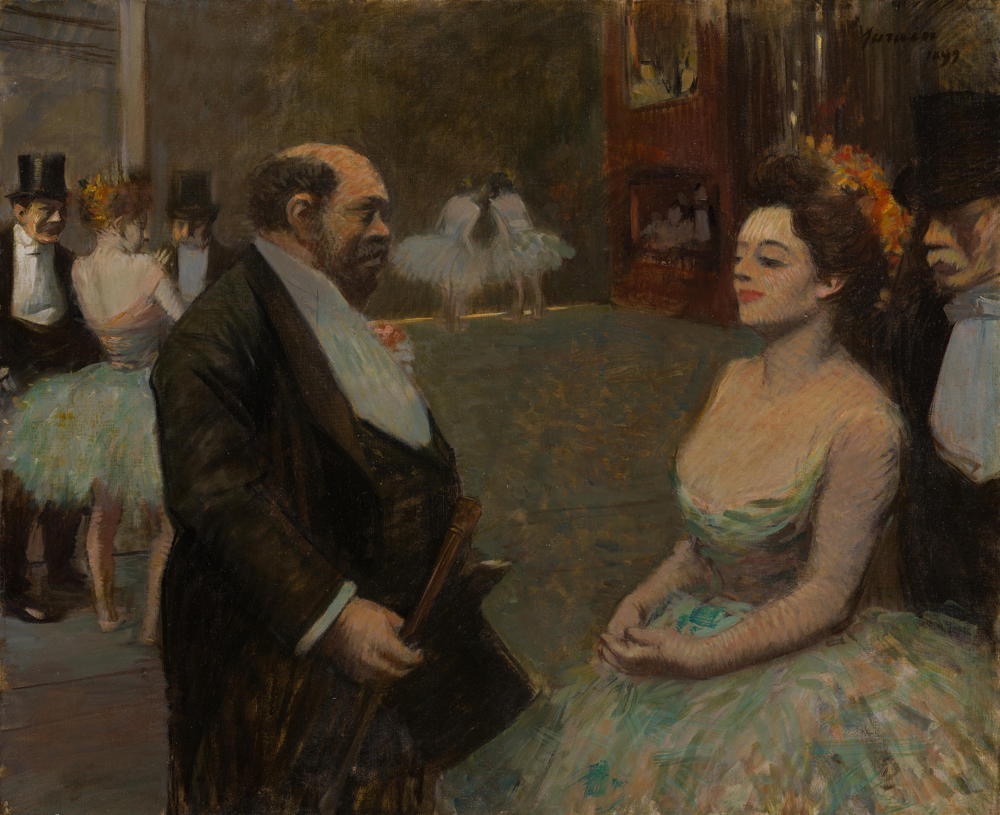
Jean Louis Forain: In the Wings (1899)
ABOUT THIS ARTWORK
In this backstage view of a Parisian opera house, ballerinas field advances from elegantly dressed male patrons, who approach them in pairs. The stoic dancer in the foreground, chin up and eyes downcast, absorbs the penetrating gaze of one large man while another looms just behind her, so close that his black top hat overlaps with her orange headdress. In 19th-century Paris, male abonnés (season ticket holders) had special access to a back room where they could socialize while watching the ballerinas warm up. Many took advantage of this privilege to sexually exploit the young dancers, who were well aware that their careers depended upon the good favor of this donor class.
——
"If you're so smart, why aren't you rich?"
Question sparked by common misconception
Our culture holds at least ten thousand curious convictions. Prominent among these are the ones insisting that wealth, and especially great wealth, imparts a wide variety of superpowers. Most notable among these must be the insistence that the wealthy are probably the smartest bears in every room, when direct evidence of this seems sorely absent. An inverse insistence might gain greater credence if anybody had the gumption to proclaim it. There does, in practice, appear to be a reverse correlation between great wealth and great wisdom, intelligence, and even kindness. I can inadvertently wound only those closest to me, but the Terribly Wealthy can crush many by simply thoughtlessly turning around, for their range of influence spreads much more widely than mine. I can choose not to go out for coffee, with nobody the worse for it, but let a billionaire opt out of their regular purchase, and it could be the death of a business. The very, very wealthy seem preternaturally responsible for many, and so seem required to practice a mandatory Noblesse Oblige.
Unfortunately, not every Terribly Wealthy person received the memo insisting upon this responsibility.
LifelongLearning

Jack Gould: Untitled
(boys and girls learning ballroom dancing) (c. 1950)
" … Lifelong Rediscovery of what I'd apparently already learned before."
I understand that I am expected to be a LifelongLearner, even though I was always a hesitant one. From my earliest days, I recall fearing the acquisition of additional information, as if it might harm me, and I can see how this innate sense might have been evolutionarily advantageous. I don't so much despise knowing; it's the acquisition that I question, for it seems like I have one of those tile puzzles in my head, and I must fiddle with it to make space for any incoming information that anybody might expect me to retain. It’s not the exposure to new concepts that I question, but the absorption of them. I have always felt like a saturated sponge.
The start of a semester in school was always terrifying, for the expectation usually seemed to be that I should already know the inevitably new material I was going to be exposed to.
Pop-Up

Attributed to Richard Parkes Bonington: Small Figures and Tent (1823)
" … while the rest of the world gets distracted going to Hell."
While The World was distracted going to Hell, I volunteered to refinish the vintage trim boards I'd saved when removing the front porch ceiling. I had the necessary equipment and experience to successfully complete the job, but I needed a paint shop. Some of the boards ran longer than my garage. I needed covered space so I could work through sun and rain. The sun this time of year could render shade essential. Rain was also always possible, and rain and paint do not mix. The answer was some sort of tent, a Pop-Up Paint Shop. The Muse bought a fancy Pop-Up canopy when she was running for Port Commissioner, to use at the 4th of July gathering in the park. It had been in its case in the basement since, except when she'd loaned it out to another candidate for the same purpose the following summer. She promised that I could use her fancy canopy, but I wanted something less precious.
Our first Pop-Up canopy, bought to use as a paint shop in the driveway, was ultimately laid low by a rainstorm.
Intrepid

Henry Hitchings: Oregon--Beyond the South Pass (c. 1860)
——
Dedicated to the memory of
The Intrepid Pioneers
Who came with the
First Wagon Train
In 1843 over the
Old Oregon Trail
And Saved the "Oregon County"
To the United States.
Erected by Old Oregon Trail Ass'n.
July 4, 1923
Dedicated by
Warren G. Harding
President of the
United States
July 3, 1923
——
" … we have an uninterrupted history of falling somewhat short of our lofty ideals."
I have lately become inordinately interested in the history of my surroundings. I was raised here, and, like anybody, learned to be unimpressed with what I experienced daily from my earliest breaths. Those unfortunate enough to be born into the center of anything understand. Those who were born in Paris, overlooking the Eiffel Tower, had their gauges set to impossible standards so that it might take a true cataclysm to even distantly impress them. Likewise, for me, who only later came to understand that I had been raised very near to the center of the universe, where gravity reliably works right. I found myself secretly pitying those whom I, by most rights, should have envied. Those who'd grown up in New York City or London seemed impoverished in comparison. Those who remained ignorant of my home country all seemed like comparative bumpkins to me, who by all rights probably appeared even more bumkin-ish to them.
Pride of place barely scratches the surface of my feelings about my home country, because I genuinely feel 'of' the place.
Weekly Writing Summary For The Week Ending 05/29/2025
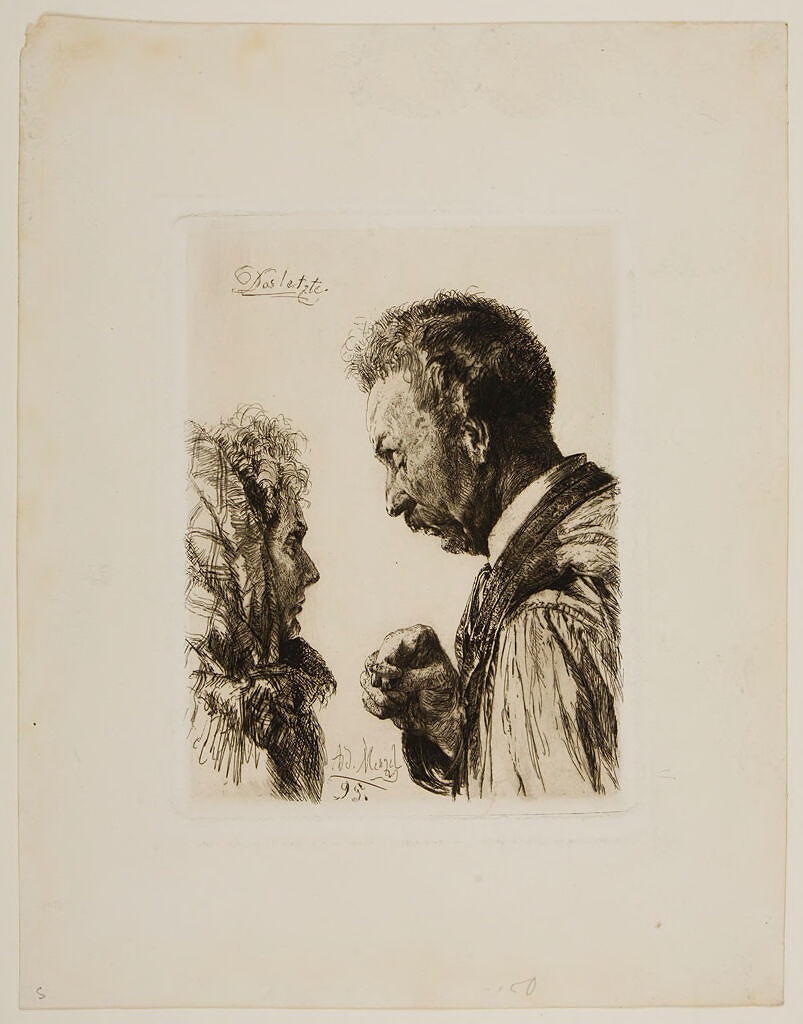
Adolph Menzel: The End (19th century)
Failing to Find What I Sought
The Muse and I think of ourselves as avid foragers, though we only forage for a few items, and we don't always manage to find what we're seeking. Last August, we headed up into our usual hunting grounds seeking Wenaha Black Currants, a local variation of the most popular fruit in Europe. We lagged the season, the bushes already barren after a hotter-than-usual July. Better luck next year, we said, and moved on to take the long way home. Along the way, we stumbled upon an enormous huckleberry patch, which we proceeded to enthusiastically raid. The Muse garnished desserts this week with leftover frozen huckleberries from that fortunate accident. (She's assured me that she tagged that secret patch so we can revisit it later this summer.)
This week, I toodled up into the wilderness again, this time searching for the sometimes elusive Morel, a pine cone-shaped mushroom much prized by the natives.
Systemantics2

Ben Shahn: Untitled [Borobudur, Java]
(January 26, 1960-February 2, 1960)
"Woe be to anybody believing they know better than even the simplest system, for they are the most easily fooled."
A panel of three judges, one nominated by our incumbent the last time he pretended to be president, found his Liberation Day tariff scheme unconstitutional and, therefore, illegal, ordering the administration to immediately stop collecting these extortions and to refund any already gathered. This ruling, of course, appealed, guts the incumbent's aggressive and ill-conceived transformation of our economy from the envy of the world to its pity. Our incumbent insists upon employing simple-minded strategies to achieve all of his aims, and such strategies hold little promise when pitted against mature governing systems.
It's not simply that the systems he attacks have been around for ages; they are each extremely complex.
Alonely
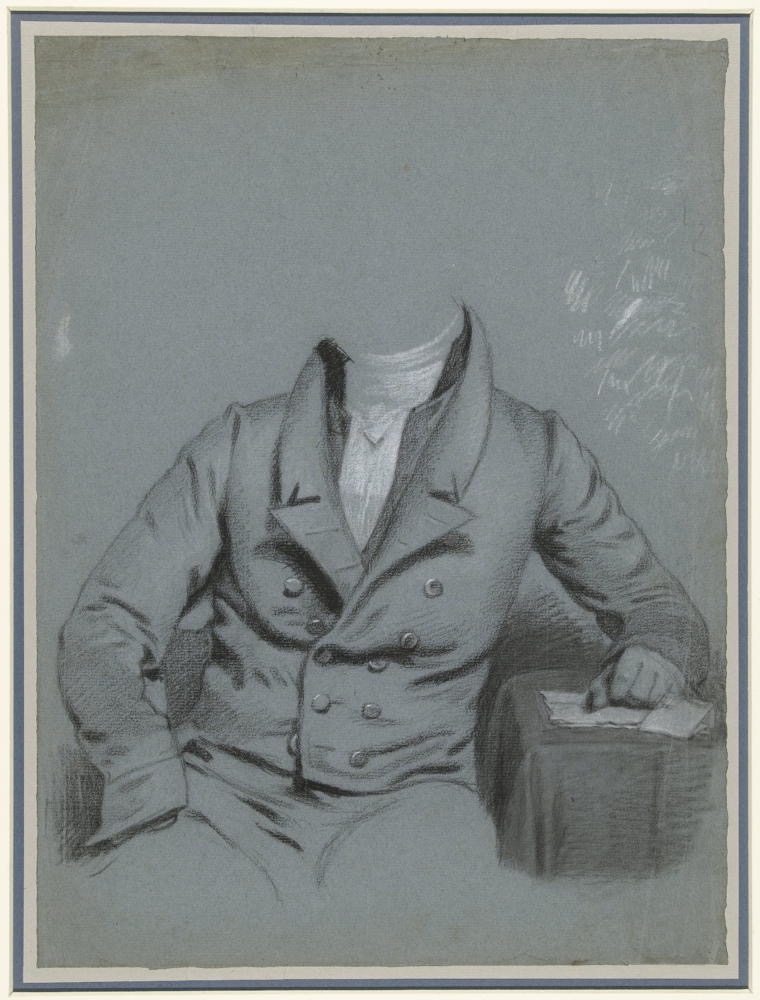
Figure 1 
Figure 2
Figure 1: Charles Howard Hodges:
Portret van een onbekende man, het hoofd niet getekend
Portrait of an unknown man, the head not drawn
(1774 - 1837)
Figure 2: Charles Howard Hodges:
Portret van onbekende heer
Portrait of unknown gentleman
(1774 - 1837)
"I remain a hale enough fellow, best met by myself …"
In this world at this time, I characterize myself as not so much alone or lonely but Alonely. I spend a great deal of my time alone. I rise extremely early to work in isolation, finishing my efforts just before The Muse rises to begin her day. A short time later, I query her about her schedule, for as a public servant, she almost always has an active agenda: meetings. I listen impasively as I learn what I might expect from the day. Typically, she's gone before noon, returning several times between sessions. She doesn't have an evening meeting every evening, but a late afternoon session will still likely delay supper. We're almost always fed by eight or eight-thirty. I head for bed around nine.
There's little time in any day for us to while away the time together.
MemorialDay
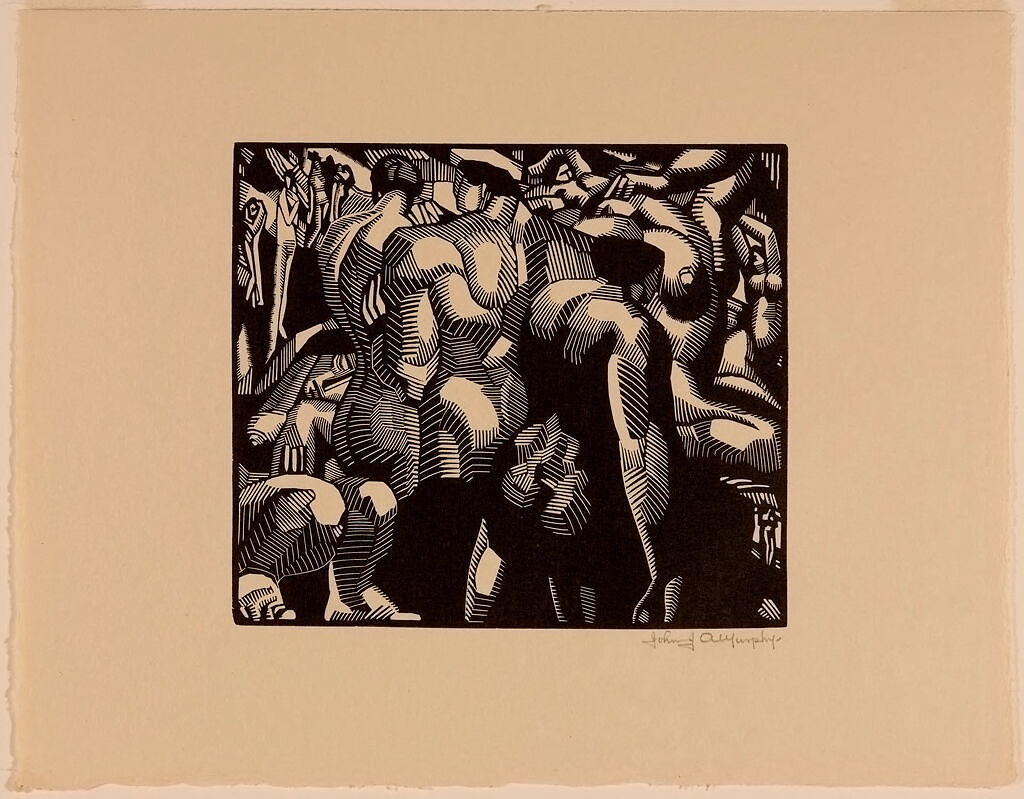
John J. A. Murphy: Memories (20th century)
"We left feeling more connected …"
Come MemorialDay, the iris have gotten closer to gone. The Peonies and roses have just started. We have plenty of blossoms to share a few with our dearly departeds. The Muse and I observe MemorialDay by toodling out to the local cemetery to play hide-and-seek with our forebears. We visit graves in a circular sequence, without regard to seniority. We always start with my great-great-grandparents, people I knew when I was small, both born in the 1870s. I remember sitting on my great-great-grandmother's broad lap in the rocking chair. The Muse later recovered it, and it now sits in our library room, still squeaking as it always has. My great-great-grandfather Luther's father, was a Civil War veteran who died of a war-weakened heart after crossing the Oregon Trail three times. His grave was lost to the ages near a dusty Eastern Oregon rimrock cowtown.
We always lose our way at first, misremembering exact locations.
Twenty-Three

Willem Claesz. Heda: Still Life with a Gilt Cup (1635)
Gallery Comments:
The range of grey tonalities that Willem Heda could paint is astounding. With this subtle palette, he deftly rendered the objects – of pewter, silver, damask, glass and mother-of-pearl – on this table. A few yellow and ochre accents compliment this refined interplay of colours. Heda specialized in near monochromatic still lifes, so-called ‘tonal banquet pieces’.
——
" … to revel in what randomly colliding atoms can sometimes produce."
I met Mark on the same day I met The Muse, so it seemed especially fitting that he'd made the long trek across the state to visit on our wedding anniversary, May 25. We were married on 5/25/02, and this year's anniversary would fall on 5/25/25, Twenty-Three years later. Our life together has been characterized by fives and twos by inadvertent design. The Muse made a fabulous veal scallopini supper, and we sat around the table reminiscing. Our wedding had been a cooperative affair. Everyone invited had also been asked to help in some way. The result was the product of everyone present. We celebrated being together as much as we celebrated the marriage. On reflection, over supper, we recalled all who were no longer with us, twenty-three years later.
We were in the same house, now extensively renovated.
Thinning

Jacques Callot: Gardener Pruning a Shrub (17th century)
"My garden tolerates my well-intended presence."
I think of gardening as a nurturing activity, though that description misrepresents the bulk of my effort. Much, if not most, of the time, I spend communing with nature there, defending myself against encroaching fertility rather than trying to encourage it. Sure, I maintain my compost heap, recycling every non-meat bit of kitchen waste back into superrich soil, but the plantings here hardly need any further encouragement. The soil, after more than twenty years of continuous improvement, has reached a level of self-sustainability. None of it will ever need much fertilizer or nurturing in my lifetime. Water whatever into the soil, and it will try to take over. Therefore, I spend most of my gardening time discouraging plants from taking over.
As with any garden, weeds prove to be the most prolific plants.
Aftering
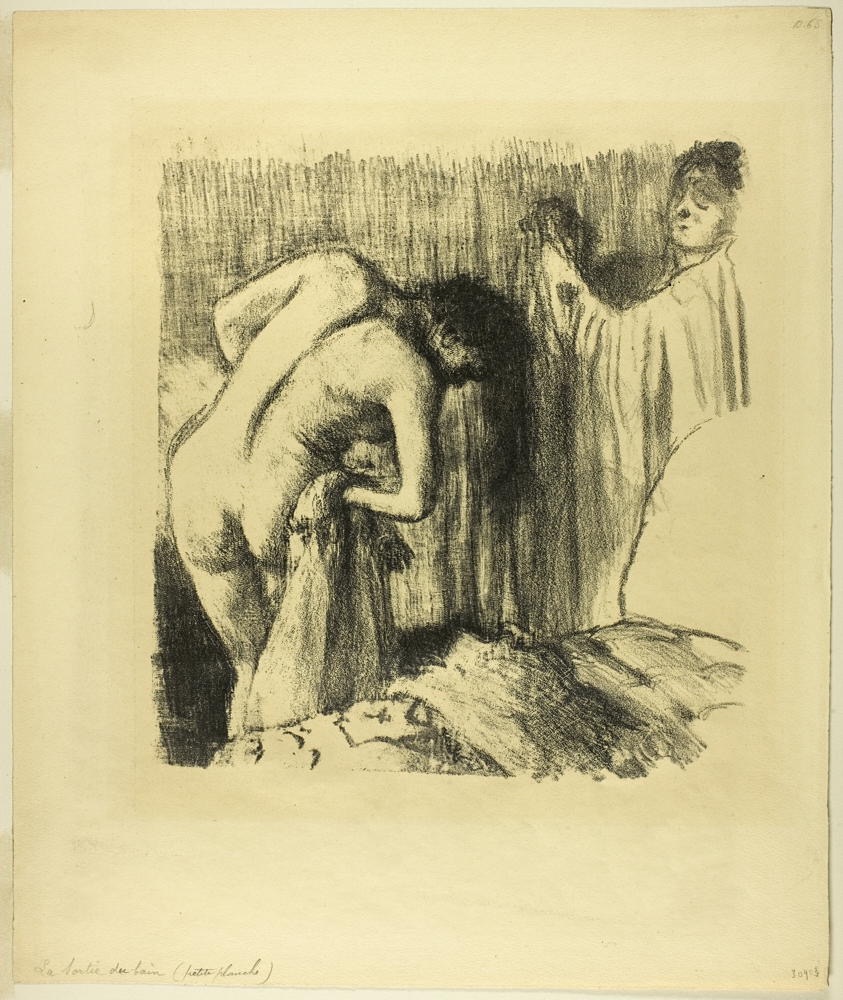
Edgar Degas: After the Bath III (1891–92)
"I'll be actively Aftering until this nightmare's over."
During an intolerable time, I appreciate even more fully the human capacity to project into a more satisfying future. Even if it comes in the form of daydreaming, there's something supremely satisfying about it. I can seemingly leave present troubles behind me for a spell and heal myself there. These respites help render difficult experiences more tolerable and prove to be a godsend for those of us who occasionally find ourselves overwhelmed. I find reassurances in the realization that, however awful, every present proves fleeting, never to return. If today seems awful, tomorrow and especially the days after, promise at least the potential of better.
Those who believe they can extend their current streak indefinitely tend to be the most disappointed in the end.
Weekly Writing Summary For The Week Ending 05/22/2025

Jan Saenredam: Spring (1601)
Mastery Was Always Illusory
I swear that I used to understand how this world works, though I probably never did. It might be that none of us ever understood or could understand. We get by almost exclusively via lucky guesses and collaborations. Without either, we'd be sunk. I over-rely upon The Muse, who understands more than I ever knew needed to be understood. She relies upon me, too, though. Nobody is self-reliant anymore, and never was. I feel increasingly vulnerable. I'm finally arriving at the age where I can no longer deny that I've been aging. My doctor concluded that I'm still street-worthy after my annual physical last week, just before I managed to wretch out my back again. Then I caught a common cold, a not-so-common experience anymore. I used to be able to set up a Zoom call, but the application has become user-hostile as it's claimed to contain more intelligence. I miss the dumber version that reliably remembered me from one session to the next. Now, I have to invoke a Pastword remembering app in order to access my account, and the smarter new version seems to assign a unique account number to each session, so regulars cannot use their familiar logins. Neither can I. I'd ask why if I didn't already know the answer. Entropy rules here and always has. Mastery was always illusory.
Futuristic

Corita Kent (Sister Mary Corita):
let the sun shine (1968)
Inscriptions and Marks: Signed: l.r.: Corita
Printed text reads: LET THE SUN SHINE IN
the creative revolution—to take a chunk of the imagined future and put it into the present— to follow the law of the future and live it in the present. Waskow
inscription: l.l., in graphite: 68-69-E
"Let's focus, as we almost always have, on Making America Great Like Never Before."
The American Way might be most properly described as Futuristic. We live in our future. Dissatisfied with our present, we project and take ownership of a better future. We are gleefully mortgaged. In the fifties and sixties, when I was a kid, the future seemed more present than it has ever been since. Since then, we've seen a slow erosion of who and what we were once destined to become. We grew up to disappoint ourselves. Conservatives, always a presence, began asserting a backward-looking dominion over us, as if our futures featured sin instead of the always before expected salvation. They equated mortgages with penury and our unique sort of prosperity with degradation. They worshiped tax cuts and balanced budgets, false gods from the distant past, over our proven, reliable gods from our future. They promised less and delivered worse, proving themselves wildly unpopular. They'd get elected by lying, by playing bait-and-switch politics.
Whomever reviles their future undermines their past, for our past holds no relevance except that which is delivered by its diligence.
DoubleBounding

Will Hicock Low:
Pale Grew Her Immortality,
For Woe of All These Lovers (1885)
"It was already plenty great enough …"
One cannot exercise MAGA-style governance and retain a democracy because the two seem in fundamental opposition with each other. MAGA demands authoritarian leadership, someone, above all, willing to tell others what to do. It also presumes that the majority will passively follow, regardless of the questionable direction from the top. Democracy assumes almost the precise opposite: a populace willing to be actively involved in deciding direction and the gumption to follow properly determined decisions. Both MAGA and democracy follow their leader. The MAGA leader is a person, while the law leads democracies.
Once elected, MAGA faced a dilemma, for the country remained a democracy rather than an autocracy.
Prosterity
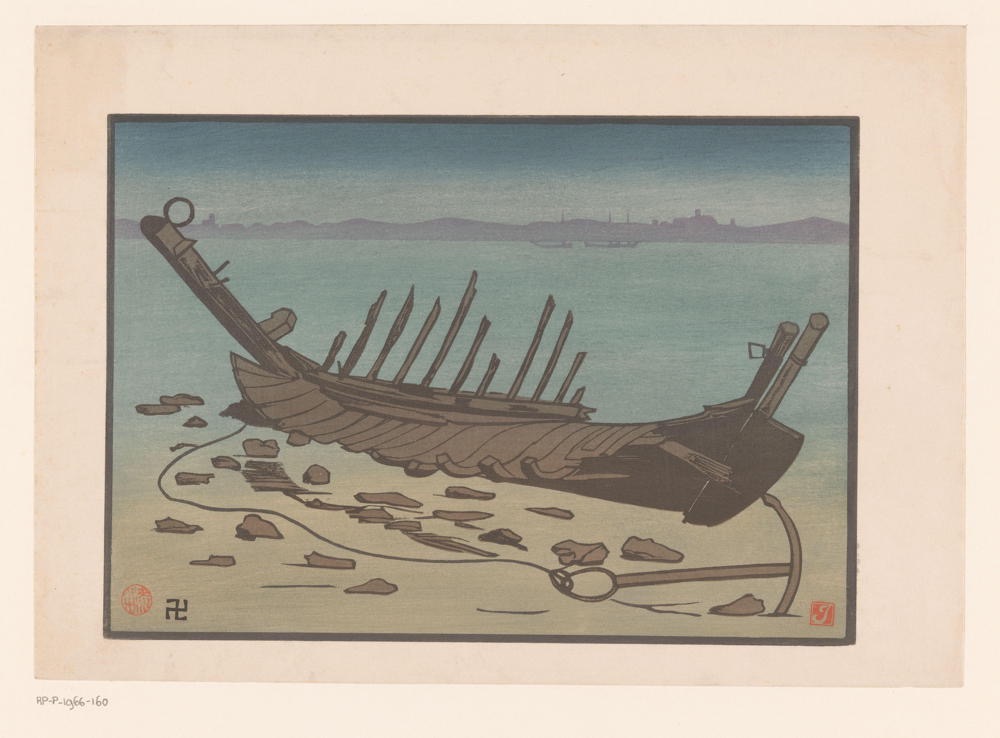
Prosper-Alphonse Isaac:
Wrak van roeiboot op strand in Cancale
[Wreck of rowing boat on beach in Cancale] (c. 1912)
"I pray that we might come to understand one day."
Those buildings fortunate enough to still have businesses leasing their street-level spaces are nevertheless hollow above their second floor. Portland, Seattle, and San Francisco mirror each other. A generation ago, their downtowns bustled with economic activity. Each was the absolute envy of the other as postwar prosperity reversed their wartime austerity. Actual prosperity resulted. Since, a series of austerity-promoting presidents and feckless Congresses have managed to pretty much hollow out the promise evident on each street corner then. Now, Portland shows no shortage of first-class hotel rooms that overlook empty windows in century-old, once-proud commercial edifices. The Starbucks doesn't have seats, only stand-up tables to discourage the homeless from encamping there. The visiting writer can't, as he once casually did, find a corner to create his morning missive. He takes one to-go instead and stumbles back to his tiny first-class hotel room, with altogether too much furniture, overlooking near absolute devastation.
The austere years bought us little.
Dementia

Unknown Artist: ‘Crazy Quilt’ Parlor Throw (1887/88)
Chicopee Falls, Massachusetts, United States
"They were neither patriotism nor loyalty, but the effects of top-down Dementia."
A case could be made that our incumbent suffers from Dementia. The evidence seems overwhelming unless presented to a partisan supporter, who might as well also be suffering from the same disorder. The behavior of the incumbent's party members exhibits the same dysfunction evident in their leader. Fish. Water. They cannot see it. The rest of us can't help but see it in nearly every action of both the incumbent and his followers. Nothing else rationally explains the behaviors. They're not entirely logical, but neither are they merely irrational. They seem non-rational, not guided by reason or explainable through a reasonable description. They are not wholly random, but somewhat more patterned, with a pattern that probably best resembles a crazy quilt. It's all of one kind yet never rational. Empassioned explanations utterly fail to explain anything. People seem patient, perhaps too patient given the gravity of the resulting situation. The whole administration resonates with the clearly disturbed behavior of its leader.
This response seems perfectly understandable.
Dubiety

Heinrich Hoerle: Worker
(Self-Portrait in Front of Trees and Chimneys)
Arbeiter (Selbstbildnis vor Bäumen und Schornsteinen) (1931)
"Justice, like freedom, stands on firmer premises than the dubious."
Never before in all history has a presidency attempted to administer upon such dubious premises. I could label this the Dubiety Presidency. Each proclamation has been justified by citing some obscure ruling obviously used out of its original context. An insistence that our present condition legally puts us on a war footing, for instance. Congress might tolerate these imaginings, but so far, the courts, as has always been their purpose, have remained dubious. They call a questionable justification into question. They question baseless accusations. They restore a much-needed sense of reason to the proceedings. The fever dream that always was MAGA was never based on anything even distantly resembling reason or fact. It was impure emotion packaged as if it might qualify as justification when it wasn't, and it couldn't succeed. The vagaries of our system allow an incumbent certain latitude. He can act first, knowing he'll only be questioned later. Later, he will have already effected some change, inflicted genuine damage. Then his act becomes something in need of reclaimation. Employees, acting in good faith, follow his directives only to become complicit in some grave miscarriages once the courts find against the incumbent again.
It's become a pattern now.
WordSalad
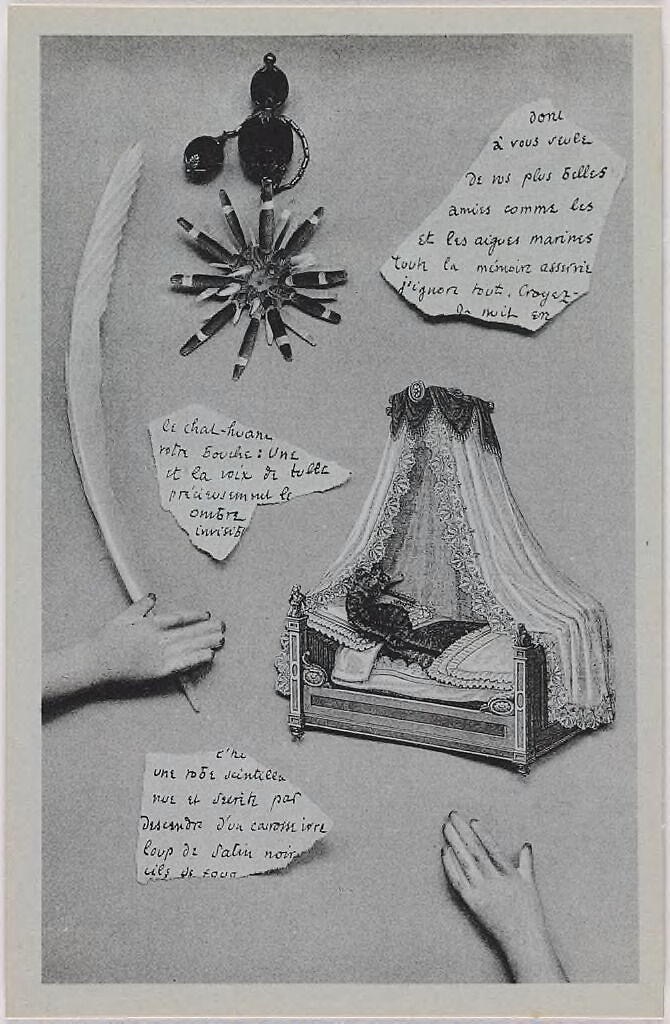
Georges Hugnet: Au pied de la Lettre/Word for word
Series/Book Title: The Guaranteed Surrealist Postcard Series
(1937)
"He does not want to be accurately understood."
The same menu every meal with this guy. Breakfast, lunch, dinner, and snacks - the same things always come to the table. Standing up, sitting down, or on the run, it remains identical. Furthermore, it tastes terrible. The mouth feel remains the same. It's always too salty and never quite sweet enough, though it's obvious sometimes he's tried to sugar-coat it, often with saccharine substitute. Still, it never manages to taste very different. It's somewhere south of gourmet while still north of greasy spoon. It always comes too soon and stays too long. It's not just him, though he's clearly the instigator. Nobody else could create such culinary abominations. Even when slathered with that inevitably gloppy dressing and gaudy flags flying to distract, it remains the same incomprehensible flavor to even the most sophisticated palate. He deals exclusively in WordSalad.
Nobody, not even the incredibly well-paid shill commentators, ever really understands what he's saying.
Weekly Writing Summary For The Week Ending 05/15/2025
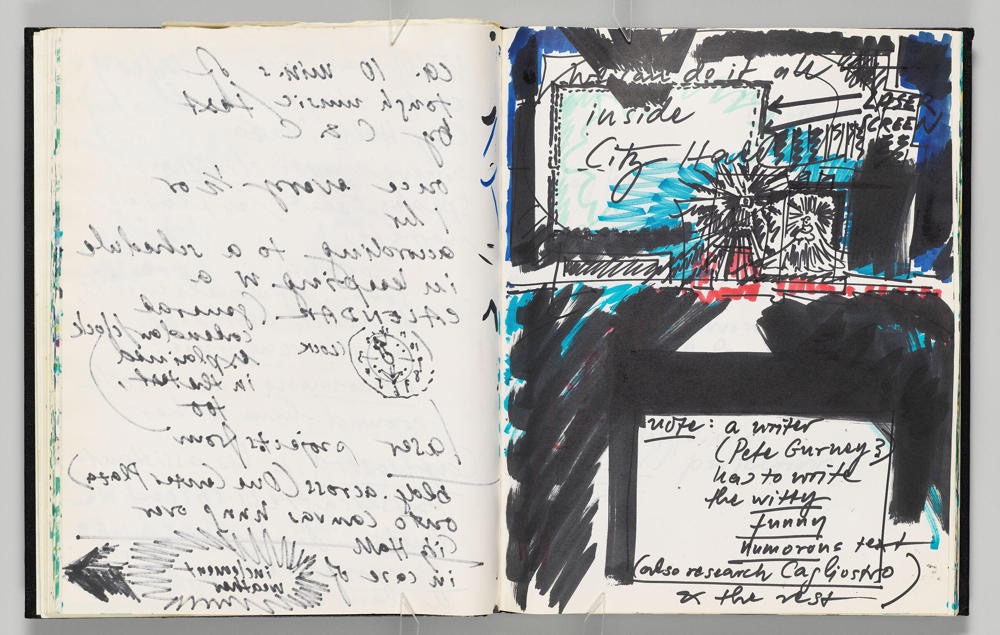
Otto Piene: Untitled
(bleed-through of previous page, left page);
Untitled (notes with design for stage and screen, right page)
Series/Book Title: Sketchbook:
"Retrospective of Inflatables"/"Tobago faces"/Landscapes
(1984)
So Much For The Speeders' Experience
If I could wish everyone one experience, I might choose to bless them with a leisurely toodle through The Palouse in Spring. Much of the year, The Palouse seems an unlikely wish to bestow on anyone. In High Spring, though, anyone might readily understand the blessing. It's green where most of its year knows only buff beige. It's surprisingly yellow as farmers have increasingly embraced Canola seed culture as an antidote to abysmal export wheat markets. It's lonely highway, two-lane blacktop, when you might have been convinced freeways had conquered and ruled every worthwhile route to anywhere. It's the slow way there, uninteresting to anyone still striving to get there first. Oh, there are plenty of drivers who haven't read the memo, passing on blind turns, apparently more anxious to arrive on time than alive, but those have always been there and are easily tolerated by anyone tenaciously insisting that they always win. I pump my brakes to ensure they can return to their proper lane before they execute the Wylie Coyote they seem insistent upon manifesting. Every second I slow prolongs my primal experience. This was never a race. I suspect that The Palouse might be best experienced at the speed of a walking Horse, the way my ancestors traveled. They could breathe in the scents that only ever manifested that one week in Spring, and for the duration of their passage, they were in the center of every possible universe. So much for the speeders' experience.
Weaponizing
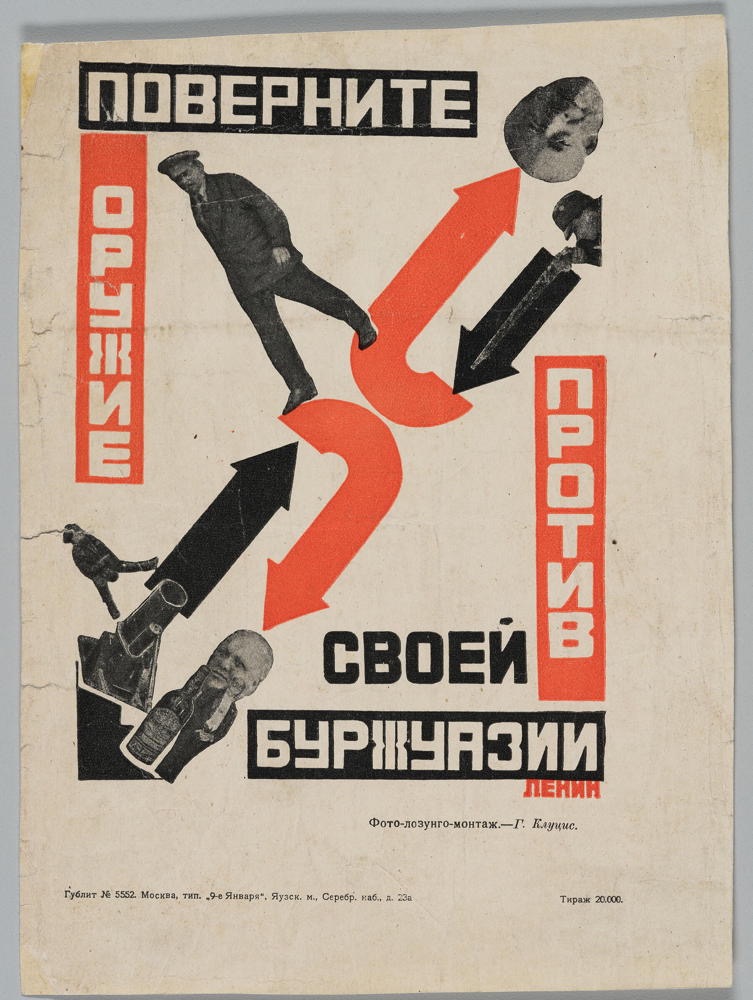
Gustavs Klucis (Klutsis):
Turn Your Weapons Against the Soviet Bourgeoisie
Original Language Title:
ПОВЕРНИТЕ ОРУЖИЕ ПРОТИВ СВОЕИ БУРЖУАЗИИ
(c. 1924)
"We might as well believe ourselves blessed to have elected
just this sort of incumbent to remind us who we always were."
The sickly scent of true desperation accompanies our incumbent's every official action. They seem overly staged, as if the production assistant feared not being noticed. Their content often proves incomprehensible, much like the campaign "rallies" that preceded this presidency. The pronouncements do not properly parse and resolve to the fundamentally incomprehensible, though a deep sense of anger inevitably shows through the cheap, glitzy veneer. One finally concludes that he thinks he’s exacting revenge from an earlier assault to mend some essentially unhealable wound. These staged performances amount to elaborate defensive stances. It might seem as though he's actively assaulting much of what we hold dear, but he's more likely frantically shoring up a defensive perimeter he deeply fears has already failed him. The more outrageous the messages, the less convincing they seem. He's already throwing the kitchen sink into action, a sure and certain confirmation that he deeply fears he's losing, that he's likely already lost.
He accuses his predecessors of "Weaponizing" our government, but it's he who's engaged in weaponization, whatever that might mean.
Venge

Adrian van de Venne:
The Donkey Laden with Food,
from Emblematic Figures of Animals (1633)
ABOUT THIS ARTWORK
Prints of animals could be accurate and fanciful simultaneously. This finely engraved yet slightly caricatured scene from Aesop’s Fables depicts a donkey laden with fine food and wine who nonetheless happily gnaws at a prickly thistle instead. Moral interpretations of the text have ranged from “One man’s meat is another man’s poison” to a critique of stinginess. Though unsigned, this humorous image of feast and famine set off a chain of copies, ironically ending with a dozen Aesop roundels that decorated the back of trenchers, wooden plates used for the final fruit and nut course in England.
————
"It's probably nobody's friend and certainly everybody's enemy."
With this incumbent, a raft of archaic usages appears to have made a comeback. Perhaps it's the conservative lilt, which intends to return to simpler times, but terms not seen in public since the Old Testament have been appearing on the lips of even the most unqualified cabinet secretaries. Many commentators have compared their vocabulary to that which emerged in 1930s Germany, where certain terms had to be resurrected to describe the horrors being initiated. Nobody had seen anything like them since at least the Dark Ages, and, sure enough, the emerging vocabulary did, indeed, accompany a replaying of some of the Dark Ages' greatest hits. Proper euphemisms gained popularity to avoid describing what was actually happening, just as they have today. Concentration Camp looked better in print than the more direct Death Factory, and the meaning of rights and freedoms were flipped on their heads for the duration. Rights became unspeakable obligations. Freedoms became insidious conscription. Life became death, and death equated with a better life.
Venge has become perhaps the most frequently used.
Emoluments
El Greco (Domenikos Theotokopoulos):
Christ Driving the Money Changers from the Temple
(c. 1570–75)
"I suspect his first impeachment indictment will focus upon his many violations of the Emoluments Clause."
What's in it for me? has never been a question that comes very naturally to me. My birth family raised me under a more self-sacrificial ethic. I always asked what I could do for my country rather than what it might do for me. I do not believe that everybody shares my perspective. Indeed, when reflective, I don't share it, myself, because I learned through sometimes painful repetition that it's often better if I understand what's in it for me when I engage. Not to get all self-centered about it, but I discovered that I also have valid needs and that it need not be all about me for it to have some alluring something in it should I choose to engage. The choice matters. I was raised to default toward self-sacrifice, as if dimninishing myself should serve as adequate payment. I'm still apt to default in that direction and I often require considerable circumspection to catch myself before I martyr myself again.
Some were apparently raised with an opposite ethic, though theirs hardly seems ethical to my reconning. They wouldn't think of lifting a finger without an explicit agreement concerning the resulting payment, and sometimes even requiring a prepayment or deposit to initiate engagement. Their employers are in their debt. The ego strength supporting this stance astounds and confuses me. What could lead anyone to believe they're worth any outlay before they've delivered anything on their promise? This does not smell like service to me. Nor does it resemble what I consider a free or fair exchange. Render the service, then accept payment. In extreme cases, perhaps create a sinking fund to hold the funds until the contrracted effort's acknowledged as done.
Our incumbent observes the latter order. He seems in no way self-sacrificial. Historically, every prior holder of that office has felt as though it was honor enough to simply hold the office. The trust extended by the voters represented essentially a prepayment of whatever salary the execution of the office's duties might provide. This guy has been scheming to bring in more personal revenue from his first second in office. It has often seemed as if he sought the role just for the income it would attract to him, personally. The actual responsibilities of the office seem secondary to how he conducts business. He comes across as a definite Me First character, which is to say he seems to lack some essentially character required of those who hold high public office. The Presidency, especially, was intended to be fulfilled more selflessly than selfishly.
Article I, Section 9, Clause 8 of the U.S. Constitution, The so-called Emoluments Clause, prohibits federal officeholders from receiving gifts, payments, or other things of value from foreign governments without Congressional consent. Along with preventing the federal government from granting titles of nobility, the Founders intended it to safeguard against foreign influence and corruption by ensuring that public officials are not influenced by personal gain from foreign entities.Clearly, our current incumbent does not subscribe to that element of our Constitution. He has proven to be a pick-and-choose chief executive, selectively ignoring significant elements of the checks and balances our founders prescribed. Consequently, he adds to the growing Bill of Particulars his adversaries have been accumulating with almost every decision he's been making. Tension builds with each pronouncement.
Few disagree with any fair payment scheme. Many in the public believe their president to be overpaid. They hold the same opinion of their dog catcher, for public service was never supposed to make anybody rich. Accepting a gift of a $400 million dollar obsolete airplane from a jihadi sympathizer wouldn't seem like the shortcut to anybody's heart, but the MAGA crowd lost its pride when it lost its mind. It's heart followed. They don't seem to mind that their titular leader makes billions corrupting his office, our office of our presidency, not his. The plane seems like spare change when compared with his crypto-currency schemes and stock manipulations. Character cannot be purchased no matter how many billions get exchanged. Corruption rots more than merely the direct participants. The context itself sours as simple decency decomposes through complacency and greed. Jesus chased the moneychangers out of the temple, the one exchange where he seemed to genuinely lose his cool. Those who believe they can barter decency for their own enrichment render everyone else poorer, however wealthy they might become. I suspect his first impeachment indictment will focus upon his many violations of the Emoluments Clause. Good riddance!
©2025 by David A. Schmaltz - all rights reserved
El Greco (Domenikos Theotokopoulos):
Christ Driving the Money Changers from the Temple
(c. 1570–75)
"I suspect his first impeachment indictment will focus on his many violations of the Emoluments Clause."
“What's in it for me?” has never been a question that comes very naturally to me. My birth family raised me under a more self-sacrificial ethic. I always asked what I could do for my country rather than what it might do for me. I do not believe that everybody shares my perspective. Indeed, when I reflect, I don't share it, myself, because I learned through sometimes painful repetition that it's often better if I understand what's in it for me when I engage. Not to get all self-centered about it, but I discovered that I also have valid needs and that it need not be all about me for it to have some allure in it, should I choose to engage. The choice matters. I was raised to default toward self-sacrifice, as if diminishing myself should serve as adequate payment. I'm still apt to default in that direction, and I often require considerable circumspection to catch myself before I martyr myself again.
Some were raised with an opposite ethic, though theirs hardly seems ethical to my reckoning.
Surrendering

Anonymous Germany, Anonymous Italy:
Book XXXIII.10 Macedonians pretend to surrender
{Quarte Decadis Liber Quartus p. CXCVIII verso}
Series/Book Title: Illustrations from Livy, Decades.
Venice, Philipp Pincio, September 27, 1511 (1493)
" … to continue contemplating a Surrendering I'll never accomplish."
The seemingly endless inanity eventually wears anyone down. Surrounded by monstrous stupidity, the least of us start feeling defeated. Logic won't work. Reason fails us again and again. There's no reasonable explanation. We eventually say, to ourselves if to nobody else, "Maybe I'm the crazy one." We're exhausted trying to maintain what we previously never even needed to consider. I stopped eating eggs rather than continue fretting over their ridiculous price. I sense my world contracting. I was raised with the explicit expectation that our universe would inexorably continue expanding, so I hold few antibodies to defend against this unlikely experience. I reframe until I appear blue in the face, but all to little avail. I feel altogether too much of a world that seems to exclude altogether too much of myself. I feel older than my age. My back began bothering me as if I'd been shouldering too great a burden. Weariness haunts me. I declared an obscene number of sick days. I feel defeated much of the time, though little of substance seems to have changed.
Our incumbent trades exclusively in paper tigers, though even the paper kind can still cause real havoc.
TEaCh

James Gillray: The Graces in a High Wind
published May 26, 1810
published by Hannah Humphrey
"I hope never to become its master."
The incumbent uses Truth Social, a failed social media experiment in which he holds majority ownership, to share his lies with the world. I suppose a few of his postings contain honest renderings of his thoughts and feelings. Those elicit a near-universal Ewww response from most of the public, offering glimpses into an internal universe about which we imagine we'd be better off never knowing. But it's a given that everybody must employ tech to count these days. Those not plugged into the latest 'thing' seem hardly worth considering, and I'm little different other than the fact that I cannot seem to keep up. I resist downloading every promising new app. I have never once played a video game on any of my many machines, and not just because I do not know how to download and play any of the curiously popular video games. They belong to the class of experiences I've deliberately avoided engaging with, believing them to be the electronic equivalent of poison. I avoided Candy Crush like it was plague. Same with Wordle, whatever that entails. I'm the sort who can't absorb the rules and key strokes required to play because that sort of play feels like excruciating work to me. My eyes glaze over, and I become unresponsive.
I've likewise avoided learning how to operate Microsoft anything.
Trappings

Margaret E Price:
Princess Furball attends the royal festival
adorned in her golden dress (1921)
" … deserve to ultimately be humbled by their surroundings."
Power seems an intangible entity. Nobody would suspect one possesses it until they wield it. Titles largely seem to threaten its use more than promise it. It seems too easily over-reached. It can often be breached. It can manifest as defensive or offensive. It need not be used at all. Gaining power tends to reveal more of a person than many other experiences might, for it carries a frightening capacity to buoy one's self-credulity. Anyone unprepared for a certain shock of recognition or an awe in their own presence seems likely to embarrass themselves without noticing. The true test of any influential person might be the restraint they employ. Not using power serves as the most potent use of power. In this way, power always proves paradoxical. To use it is almost the same as to abuse it, though shrinking from its legitimate uses renders it useless. So, a certain maturity seems necessary for anybody granted power. We've seen immaturity undermine otherwise powerful people. We've watched the assumption of power go to someone's head. We've seen the Trappings that inevitably accompany power catch the attention of the suddenly powerful to utterly undermine whatever their intentions might have been.
The Trappings our incumbent enjoys seem to distract him.
Weekly Writing Summary For The Week Ending 05/08/2025

John Simmons: Unite or Perish, Chicago (1968)
I Will Inhabit My Future
I was supposed to write this introduction on my new MacBook Air, which arrived yesterday afternoon just as I was sitting down to create this week's writing summary. I deferred playing with that new machine until after I'd completed that chore, setting the copying over of the six hundred thousand odd files through supper. It was still happily grinding away two hours later. When I rose at two, the progress bar reported that three more hours remained, so I went off to distract myself for that time. Back just after five, I found it had finished copying, but it hadn't yet finished with me. It had prepared a gauntlet of Pastwords for breakfast, each with a slightly different name and incomprehensible, in turn. With The Muse's groggy help, I made it through the first two gates and was delighted that Safari and Chrome could remember the last opened tabs. The new computer apparently had a functional touch key, which might mean that I won't have to continually type out my seventeen-digit Pastwork so frequently. That alone would justify the purchase. I'm hoping the continual crashing that has become a near-constant background annoyance might finally be reduced or even eliminated. Facebook couldn't remember me or my Pastword, and, as is often the case, my Pastword-remembering software apparently couldn't remember the most current iteration, either. I figure if it can determine that my Pastword's incorrect, it already knows who I am and is just playing hard to get. Typed in Pastwords make as much sense as TSA pat-downs yet we all submit to the tyranny. The Facebook failure chased me back to my old machine, even though I knew I'd undermine the parallel environments final migration would require. It was Friday, and I was not yet ready for my daily posting and my preparation for my Zoom Chat. One day, I will inhabit my future.
SlyenceFriction

Lucas Emil Vorsterman: Backgammon Players (c. 1630)
ABOUT THIS ARTWORK
Adam de Coster was a prominent painter of illuminated night scenes in Antwerp around 1630, about the same time that Lucas Emil Vorsterman was engraving works after his popular contemporaries in the same city. A student of Peter Paul Rubens, Vorsterman employed a style that was originally similar to that of the Flemish master, until a falling out with Rubens and subsequent trip to England provoked him to create stronger, more stylized, Caravaggesque engravings such as Backgammon Players. Clearly influenced by De Coster’s handling of light, Vorsterman brightened the otherwise dark scene with two candles whose flames illuminate the faces of those seated around the table.
"Real life does not even distantly resemble a game of Grand Theft Auto, and probably never will."
A seemingly separate species of human has emerged over recent decades. If this species existed before modern times, they were never terribly influential in human affairs. In scientific circles and among scientific professionals, odd lifestyles doubtless proliferated and were tolerated. Many famous early scientists’ histories read like psychodramas, but they were rarely asked for their opinion on taxation, for instance, or moral questions. Today, nerds seem to have gotten out of hand. Gamers carry a certain reverence in much of the public mind, as if their successes on the Xbox certify them as geniuses or something. Those who take science fiction seriously today enjoy a certain cachet imparted on no ancient. Those who believe we should be colonizing Mars are inexplicably thought to be exceptionally insightful rather than the more traditionally delusional. Something feels unsettling about people who choose to spend their non-refundable time gaming, especially those who consider gaming to be a competitive sport. People who get their jollies blowing away imaginary space aliens might be "on the spectrum" but seem too spacey to ever be senior advisors to a President. So much the worse for anybody who believes science fiction is mere allegory. Many now sincerely believe it's predictive and prescient.
Those who follow false Gods have never before been so involved in politics.
Pettiness

Style of Abraham Jansz Diepenbeeck:
King Midas at the Contest Between Apollo and Pan
(circa 1616–1675)
"That's the cultural capability of our present incumbent: Pettiness."
I was raised on tales of great men accomplishing great things. The possibility of a President actively promoting Pettiness never came up in polite conversation, so it's been particularly jarring as our incumbent has set about accomplishing nothing after rising to the role of so-called Most Powerful Person In The World. Such authority apparently lies in something other than the title, for our incumbent has already amply demonstrated that power lacks authority when placed in unworthy hands. It's not clever to opt out of employing lawful means to attempt to accomplish change. It's downright stupid to flaunt the Constitution because that document, above all others, amounts to sacrosanct text in this culture. Further, the oath of office insists upon an active defense against enemies of said Constitution, both foreign and domestic. It does considerably more than stretch credulity when the incumbent embodies every element of that enemy against which he took that oath, dedicating himself to defending against it instead. This paradox just seems to amplify his pre-existing cognitive disabilities.
Nothing of greatness has even been suggested since this administration, Hell-bent on not successfully administering anything, began failing to effectively rule.
Scheduled
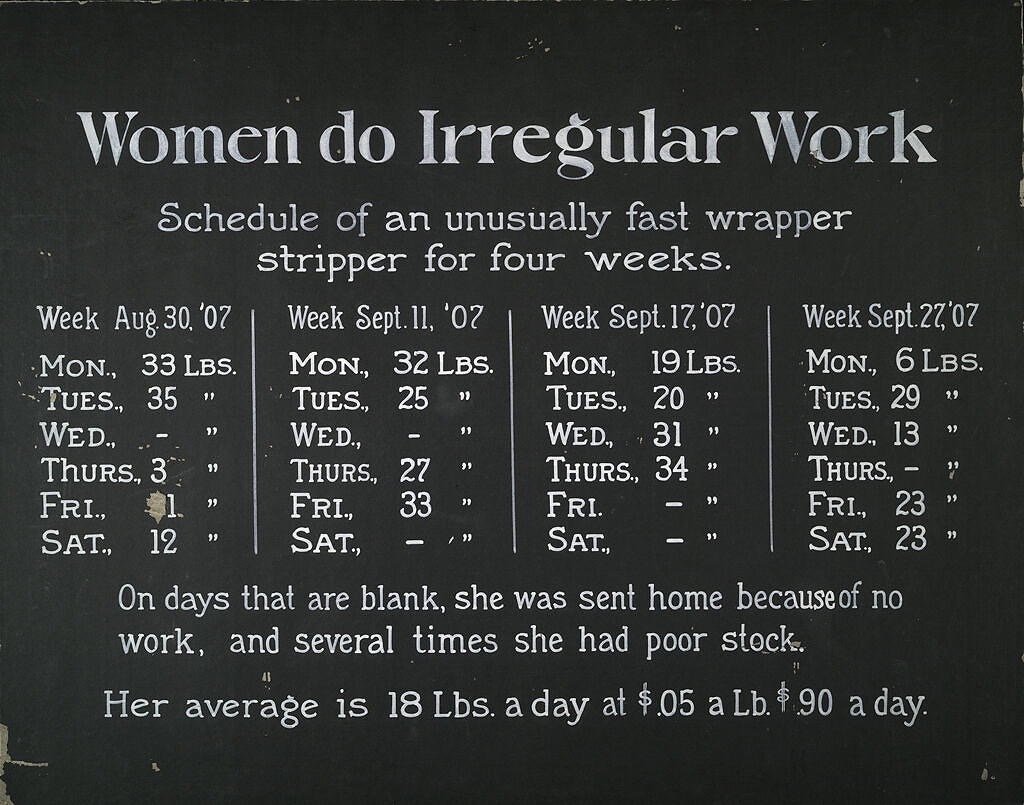
Lewis Wickes Hine: Women do Irregular Work,
Schedule of an unusually fast wrapper stripper for four weeks.
Series/Book Title: Social Museum Collection
(1907-1908)
"It was only ever eternal in the moment before it was declared done."
My dental hygienist reported that she was Scheduled into next year and booked solid into November, six months hence. Her dentist was booking into the following month, and so couldn't possibly perform any procedure not previously Scheduled. I once maintained such a schedule where I could reasonably predict my position months into the future. I inhabited a speculative reality, one capable of containing me every bit as effectively as any jail cell might have. I willingly entered, feeling secure in there rather than imprisoned. Call it job security, but I felt a real sense of certainty then. I later became a freelancer and lost most of my previous confidence. Then, I felt as though I was constantly juggling, coniving to survive somehow. Like the biblical Birds of the Field, though, I rarely starved. Plenty manifested before me, even in the absence of a tangible Schedule. I came to understand that Scheduled might have always been more of a preference than an imperative. In the absence of a Scheduled horizon, I'd reliably stumble upon one that managed to sustain me. This experience amounted to heresy.
I worked in the Project Management field.
Mistery

Master of the Die: Apollo Slaying Python, plate one from The History of Apollo and Daphne (c. 1532)
Gallery Note:
The alteration to this impression is not initially evident, but closer inspection reveals that this predominantly nude Apollo is missing his genitalia. A viewer deliberately scraped away the ink at the god’s crotch in a campaign of extremely localized censorship. Given how modestly Apollo was originally endowed, this change does not significantly alter the image overall. Rather, the god’s sizable arrow quiver dangles more provocatively between his legs than his own penis ever did. The objecting viewer, apparently lacking a grasp of age-old visual puns, may not have realized that, with his alteration, the visual emphasis merely shifted to this larger and more obvious phallus substitute.
"Eye for an eye and tooth for tooth sentences actually seem like justice to them."
For MAGAs, the past is not comprised of memories. Those of us seeking referents for MAGA assertions about the past seem doomed to disappointment, for they do not share a history with anybody but themselves. They rely upon a different basis upon which to anchor their assertions. To their minds, these are not fictional representations, but more like Biblical ones. Sure, the past might not have happened precisely like they recall, but their rememberings seem more divinely inspired and thereby more valid than what might have actually happened. Their recollections carry the gravitas of Old Testament testimony, unlike the obviously phony more conventional histories. They and the members of their tribe know better than the “lame” mainstream academics. Academic histories were obviously written with political agendas, as are all histories written by winners. The losers carry different stories and believe in theirs more fervently than any professional historian ever believes in theirs. The professionals might insist that theirs are not dependent upon belief but facts. In any wrestling match between belief and facts, bet on the beliefs to ultimately prevail.
Many advancements seem absent from MAGA history.
RecitalRules

Lee Russell:
Boy giving recitation in program at end of school term. FSA
(Farm Security Administration) labor camp. Caldwell, Idaho (1941)
"We only have everything to lose otherwise."
Lest I forget the purpose for which I started writing this series forty-five days ago, The Universe has been conspiring to remind me. In my experience, if I set my mind on something, the universe sets about reminding me when I misplace my focus. My part in the circus seems to come from forgetting that focus and generously accepting reminders. I tend to wander and weave my way, whichever way I've chosen. The universe always seems to be conspiring to remind me, and I don't mind. I appreciate that I inhabit a universe so generously disposed to focus on somebody as genuinely insignificant as little old me. I can use the reinforcement, especially when I'd committed to write about hope and coping. How have I been doing? I've been wandering and weaving, as is typically my way. I rarely travel via straight lines. I've even proven myself to be more than capable of going backwards when pursuing something, even when that something seems as essential to my well-being as coping and hope. I've proven myself more than capable of losing my way, so I sincerely appreciate this universe when it seems to nudge me back into awareness.
It's been a rough time, with interference appearing almost every morning.
Idiology


James Castle: Red Coat; verso: Back of Man ((20th century)
"The best of all possible opponents to have when battling for decency and justice."
People complain about the MAGA ideology without slowing down to appreciate its underlying Idiology. It might be that we innocently mistake one for the other. Ideology amounts to ideas and ideals—beliefs—that drive political theories and policies. It's easy to presume that some shared beliefs drive an ideological bus, when they might not be present or that influential. It sure seems as though every MAGA has undergone a brain transplant to replace their intelligence with something less inquisitive. Belief sure seems to drive their behaviors, but their beliefs don't seem to be all that consistent. What might bring them together when their beliefs only seem to converge? I think it's the urge, or more properly, the inherent inability to control that urge. It's not so much what they believe as how they believe. They believe with such conviction that they do not seem to question the reasoning behind their interventions. Because of this hair-trigger belief system, they render themselves incapable of foreseeing likely implementation complications. They act without first questioning. They engage with such unshakable certainty that they seem genuinely shaken when their latest hare-brained scheme predictably blows up in their face.
It's a genuine gift for an opponent to exhibit authentic Idiology, for however fickle the details of their moves might seem, they each share a hyper-predictable pattern.
Weekly Writing Summary For The Week Ending 05/01/2025

Charles Green Bush:
Let Us Have Peace! -Fortissimo, from Harper’s Weekly
(published June 19, 1869)
He Will Probably Never Recover
May caught me napping. It arrived while I spent most of my writing week escaping from a seriously twingy back pain that visited me for no apparent reason. One problem with even attempting to be a reasoning being comes with unreasonable events, occurrences that sidestep or somehow transcend reason. There never seems to be a reasonable end to the search for the cause of these afflictions. The doctor asks questions to which I can muster no reasonable response. The first prescription doesn't work. The second doesn't do much, either. Circa day three, I took a high-level pain pill The Muse had leftover from some prior procedure, one of the ones the doctor threatened to prescribe, so I took one. It didn't touch the pain, either. Maybe that second batch of muscle relaxers worked, or, after four down days, my body started responding to rest. By the fifth morning, my back still felt twingy, but the twinges no longer elicited grimaces. A week spent in intermittent agony serves to reset the gauge intended to determine whether I'm okay. My threshold has been considerably reduced from where I'd grown accustomed to it.
Ire

Peter Paul Rubens:
Hl. Ambrosius und Kaiser Theodosius (1615/1616)
"This reaction makes the so-called superior appear inferior and the complier seem spineless."
Recent headlines reported that many, including a few of the wealthiest and most powerful people in this universe, have taken to tiptoeing around our incumbent to "avoid his Ire." I recognize the word "Ire" as one of those holiday serving spoons restricted from ordinary supper use, exclusively reserved for company. I remember the few times it's been trotted out, not for itself, but for what it was always associated with. Its presence seems rare enough in memory to almost be considered a sacrament, warmly remembered. I proudly recall the times when I managed to spark Ire, especially in someone I was supposed to automatically provide deference: a principal, police officer, or high official who felt as though I'd disrespected their position, if not them personally. The Ire itself always took the form of threats, promising retribution for the imagined infraction. The imagined portion was almost always a misunderstanding stemming from my failure to engage with what I might characterize as adequate gravitas. I might have engaged with a superior as if he were an equal or, worse, a lesser. Few angers rival those sparked by a sleight perceived by a superior, for they might seem to threaten the whole concept of "superior." Those relying upon their position to prevent being perceived as inferior seem to possess the thinnest skin and generate the bulk of the Ire in this universe.
I prefer to inhabit a world where we employ a more level playing field where nobody can be seriously considered to be anyone's better.
Infliction

William Hogarth:
The Punishment Inflicted on Lemuel Gulliver (1726)
"Good riddance to abysmal governance."
Only apprentices ever opt to Inflict difference upon others. Ten thousand more effective ways exist, so only the deeply inexperienced ever resort to Inflicting change. The more insistent the Infliction, the less effective, and the shorter-lasting the attempted change. Those who seriously believe they can command while others will obey only successfully delude themselves. It's a sad and sorry spectacle to observe, especially when the Inflictor convinces themself that they're acting in the Inflicted's best interest. Such attempts inevitably fall far short of an actual initiative. They might initially appear to produce real difference, but whatever initially appears to stick proves to be short-lived. Considerable undoing might result, but the desired change will quickly dissolve and disappear. Further, the Inflictor will ultimately fall much further than they imagined they might rise had their initiative proven effective. Those afflicted by the attempt will be absolved of all accusations against them when they resisted. The opposition will produce the only heroes. The Inflictors will make themselves infamous.
Fresh from a multi-day affliction, an epic back spasm that left me bedridden and aching, I carry a fresh appreciation for change.
SacredSarcasm
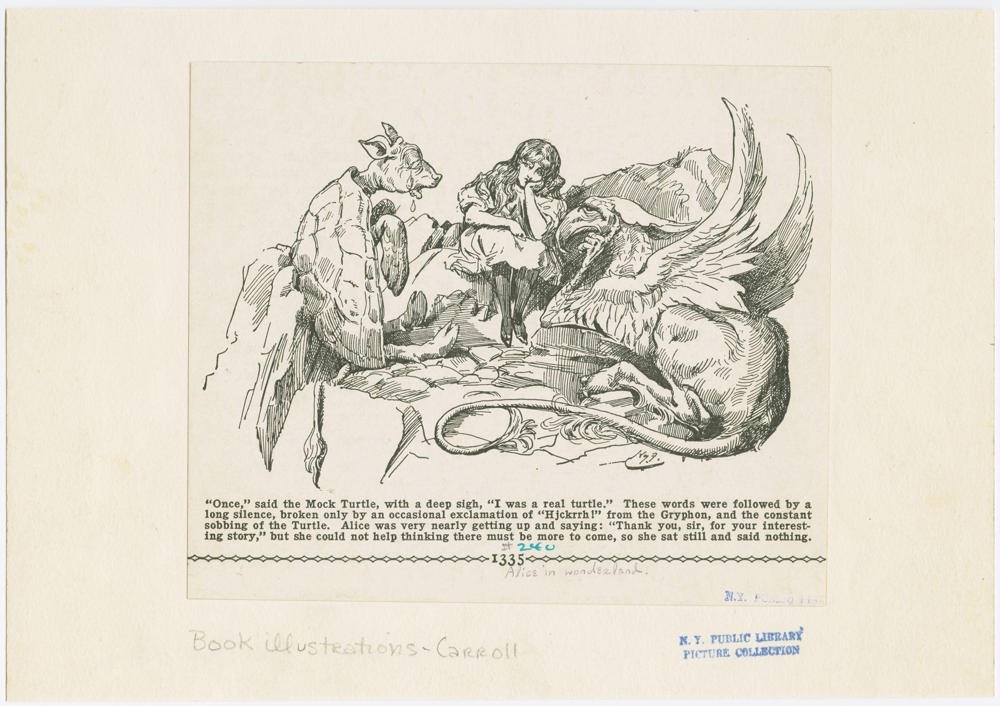
John Tenniel: "Once," said the Mock Turtle, with a deep sigh,
"I was a real turtle."
Illustration from the 1911 Edition of Alice in Wonderland (1911)
"Congratulations, or something, Mr. President! Grow a pair!"
If anything distinguishes Democracies from all other forms of governance, it must be the freedom to shamelessly mock itself in public. The chief problem with authoritarianism lies in its innate humorlessness. It takes everything, especially the microscopically irrelevant, seriously. It presumes to make daily proclamations insisting upon the most fantastical absurdities. It continually assaults common sense and its citizens' own experience, attempting to override it with idiotic ideology. One's left wondering what could possibly come next. Our current authoritarianism infection began with a full frontal assault on decency. If an unwinnable opponent were ever proposed, common decency would seem the perfect choice. Only one so thoroughly entranced in their own self-importance could ever seriously consider making decency their primary enemy. Of course, they had to ineptly hide their real agenda. This tactic barely worked before utterly undermining itself, as any founding father could have easily predicted it would, for we are not that serious a society. We were founded upon the sacred proposition that all people were created equal, which, roughly translated, means in practice that everyone holds the more or less equal responsibility to be the butt of their fellow citizens' jokes. If nobody stands above the law, nobody stands above the next derisive punchline, either.
Our society has evolved into an entertainment medium.
BadBack

Jacques Callot: Beggar on Crutches and Wearing a Hat,
seen from Back, plate five from The Beggars (c. 1622)
" … I'd be aching, too, if I had to put up with all I put it through."
I have not had a BadBack since I finally submitted to that long-deferred back surgery more than twenty years ago. Before that, I suffered from a standard stenosis and a lingering adolescent denial in more or less equal proportions. The physical difficulty was easily resolved with a straightforward surgery. The denial required more than a decade of concerted effort and considerable suffering to finally resolve, which was achieved by my merely consenting to the long-averted surgery. I tried every non-surgical alternative but mostly embraced suffering as the antidote. I got very, very good at suffering because I was already a near master at denial. I could work through that white hot blindness that waves of pain brought, essentially blocking vision. I could stand and deliver while otherwise basically unconscious. I also experienced public collapse like that especially memorable time when a blinding wave of pain disabled me while I was strolling down Lower Broadway in New York City. Miles from my hotel room, I could neither stand nor sit comfortably. That one scared me.
It took a bout of shingles to finally convince my doctor and me that I had successfully tried and worn out every possible alternative.
Restarting

Unknown, After Jean Restout: Saint Hymer in Solitude
(c. 1735)
" … whether or not it accomplishes anything else."
Restarting my machine has become the first step when producing another story. This amounts to ritual now, in that it reassures more than guarantees anything. If I don't Restart first, I might increase the risk of my machine crashing before I've finished, and then have to recreate lost parts. Writing to post involves using five or six different applications combined with plenty of cutting and pasting. I accomplish all this on my thirteen-inch MacBook Air. The small screen means I cannot just grab and drop most copyings. I need to switch displays to change applications. I save before switching between any two applications, so I'm also continually saving in addition to the constant cutting and pasting. I'm uncertain which of these operations will eventually result in crashing my machine. Usually, my blog application crashes first. I try to save something in it, and it doesn't respond. I pull up the ever-useful ForceQuit display, which usually indicates that RapidWeaver's frozen again. Then, I can ForceQuit that application and either reopen it or choose to execute another full Restart. The full Restart takes a few minutes, as each application needs to reopen. Sometimes, depending upon where the crash finds me in the process, I have to copy the contents of something like a Facebook post over and into Pages for safekeeping during the subsequent Restarting; otherwise, I'll lose whatever I've started there.
In these ways, my writing has become an exercise in paranoia.
Improv

Vasily Kandinsky: Improvisation No. 30 (Cannons) (1913)
" … as if his audience was supposed to care."
It might be essential to remember that our incumbent is an actor. Actors train in and practice the art of deception. They pretend. They might become most skilled at pretending to be themselves, an identity that typically gets garbled in such practice. The others they become skilled at pretending to be are unavoidably incomplete, for nobody, however experienced, has ever managed to thoroughly portray somebody else. There are too many edges to consciously cover. To compensate, skilled actors amplify a few of the more prominent traits of the ones they portray, thereby accentuating some of their more recognizable aspects. They become identifiable by overplaying some characteristics. Voice impersonators tend to employ a few key phrases associated with the character they play. This produces a reinforcing association, whether or not their voice very accurately mimics their target's. John Wayne was apparently the only actor whose character employed the term "Pilgrim" in their dialogue.
Actors train in their trade by engaging in Improv.
Weekly Writing Summary For The Week Ending 04/24/2025

Henry Fuseli: Milton Dictating to His Daughter (1794)
Gallery Notes:
This painting by Swiss artist Henry Fuseli depicts 17th-century English poet John Milton, who became blind in his 40s, dictating his epic poem Paradise Lost. His daughter transcribes his words while another woman listens intently as she sews. A forerunner of the Romantic Movement, Fuseli created drama through chromatic contrast. A cool light illuminates the rosy-cheeked women and casts deep shadows around Milton’s ghostly figure and face. Fuseli created this painting for his Milton Gallery, a self-run enterprise that showcased the artist’s Milton-inspired works. While this entrepreneurial venture failed commercially, it raised Fuseli’s prestige and visibility as an artist.
Given The Current Volume of Obvious Imperfections
One week each year, perhaps a few days longer, the Villa's yard takes on the Garden of Eden Scent. The apple blossom sweet of the two enormous ornamental crabapples, with the magenta one dominating, combine with the budding lilacs. When we returned from our exile four years ago this Spring, I planted five fresh lilac bushes along the back fence. They were healthy three-footers then. Now, they're topping seven feet and bursting with blossoms. They provide a sampling line where The Muse and I can sink our snouts deep into each bush's blossoms to experience the subtle differences between the various varieties. We added fish to our bubbling backyard pond this week, and I immediately felt the difference their presence brought. I suspect the neighborhood raccoons have already discovered this addition, as somebody tipped over the fountain pump on two successive nights. My lawnmower replacement for the one recalled as a potential fire hazard arrived just in time to counter the emerging lawn, and the carpenters completed installation of the front porch beadboard ceiling. I could proclaim that all's right with the world, but there's still a considerable lot that's not right yet. I feel reassured that this world can pull off a Springtime like this, even given the current volume of obvious imperfections.
Tech

Nan Lurie: Technological improvements (1937)
Works Progress Administration
"We thrive exclusively on the promise of another paradigm shift …"
Technology serves as both our enabler and enslaver. It encourages hope and creates the lion's share of the frustrations we daily struggle to cope with. If ever a human invention exemplified the notion that there's no such thing as a free lunch, Technology holds that distinction. It giveth while also taking away. It encourages before disappointing. It seems to be continually, constantly annoying. On my better days, I find ways to fiddle with it less. On my worst days, it can hold me completely in its thrall. I curse its presence and pitch a fit when I cannot access it. It improves life immeasurably, by which I mean unavoidably. It creeps into routines almost unobserved, then won't let go for anything.
It seems I can barely remember my life before, if I had a life before Tech.
Presententions

Master of the Beheading of St. John the Baptist:
Allegory: Combat of Animals in the Presence of Man with Shield (1515/20)
"Everything except the lilac garden seems twisted and broken."
I inhabit a suddenly disorienting time when usual expectations no longer reliably produce. Emerging realities seem wacky. Our incumbent leads exclusively by whim. This might entertain He With A Negative Attention Span, but it exhausts the rest of us. He appears wholly presumptuous, as if he targets every one of his mindless proclamations for The Ages. I sense he, or more likely his fundamentalist followers, thinks his "reign" biblical and, as usual, the most devout take the allegories literally. This produces predictably ridiculous reactions, the sole predictable part of his many machinations. They always go sideways and are often rescinded after inducing some fresh, otherwise unnecessary, chaos. Some speculate that chaos must be the underlying purpose, keeping opponents off balance. This almost works, except it seems to off-balance the perpetrator more than the opponents. Consequently, the loyal opposition appears to be gaining the upper hand. As usual, the incumbent seems only capable of undermining his own plans, assuming he even has any plans.
He seems to live by presumption.
Serfdom

Jules Breton: The Song of the Lark (1884)
"Let us choose more wisely going forward after we finally impeach this bastard."
The problem with monarchies must be that they require vast numbers of peasants. All that idling demands many waitpeople, cooks, gardeners, butlers, maids, footmen, and vast numbers of serfs, peasant farmers who live at or slightly below subsistence so that their monarchs might live as kings. The overhead involved seems unreasonable to us raised in more liberal circumstances. How much better might it be if everybody could become more self-sufficient and at least earn and pay a living wage? People could trade rather than indenture, choose instead of becoming chattel. This tension between the monarchial and liberal worlds has peaked lately, with a self-proclaimed dictator elected to lead the world's oldest liberal democracy. Conservatives, traditionally those most enamoured of market traditionalism, for some unknown reason, embraced him who became our first self-proclaimed dictator. Dictatorships and monarchies seem identical at some level, for they both require unreasonable numbers to perform as peasants.
The Road To Serfdom, a popular book from the 1940s by Austrian economist Friedrich Hayek, described how excessive government control of economic decision-making and central planning inevitably lead to tyranny.
GigaMa

Xiang Shengmoe:
Crab-apple Blossom from a Flower Album of Ten Leaves
(1656)
"May she fondly remember her great-grands."
The Muse's post-cancer treatment includes five years of surveillance involving frequent doctor visits and occasional specialist consultations. No reason for serious concern has yet emerged from this scrutiny, but the inquiry continues for at least another eighteen months. She could have chosen to see this specialist via tele-health. Still, she decided it might be useful to visit in person, if only to stay in touch with someone offering more experience than her local practitioner can. This means a short trip to what I'll forever call Sleazeattle, an overnight in a grossly over-priced hotel, and associated adventures. Ask me what gives me Hope, and I'll respond that the future renders me hopeful. When the present seems filled with hopeless boobs conspiring to make their lives Hell, the future never gets even distantly involved in those shenanigans. What helps me cope with how things seem to be now? Two things: the shadow of my future and the ability to roam around a bit in my present. I'm a dedicated homebody, but The Muse insists I get out into The World. I rarely regret these excursions, though I usually faunch beforehand in anticipation.
The Muse opted to see this specialist in person because it gave her an excuse to see her great-granddaughter Really. (Really's a family name! Nobody's ever a family member until after they've been given a family name to fix the shortcomings their original inevitably exhibits.) Her real name doesn't matter to family. To us, she's Really. The Muse had seen her a few months ago, but we do not live nearby, so she's already three times older than she was on that first visit. I'd never met her, and though I'm no blood relative, I still consider her my great-granddaughter. Great-granddaughters provide a reason to feel hopeful, regardless of current conditions. A GGD has an upside, which is the one thing no great-grandfather can realistically provide. My future's been shrinking constantly since the day I was born, leaving me ever further behind on the upside portion of the program. I'm more than physically shrinking. A GGD provides an extension into a world I will never know. That's hopeful for me.
The ride over was typically remarkable.
BowSaw

Jack Gould: Untitled (two men sawing large logs) (c. 1950)
" … designed to preserve enthusiasm rather than undermine it."
Yesterday, while the rest of the world was busy going to Hell, I rediscovered an often unused corner of my little Heaven here. I'd tried and failed to construct a little pop-up-paint-tent on the front of the garage to shade me while I strip and repaint some long trim boards for our front porch restoration. I'd drilled holes and set eye hooks, thinking I could string up a tarp to serve as the roof, but I was short one anchor point. I figured I could screw a left over cut-down seven-foot two-by into a paver then further weigh that down with a concrete cornerstone, but the screws failed, so I folded up the tarp and set that project aside. My puttering efforts often encounter such blockages because, despite my advancing age, I remain largely ignorant about calculating forces. Combine that innocence with at least an equal ignorance of how such problems are typically solved, and I have an explanation for why my grand schemes so often initially fail. I do not take these failures personally. I consider my attempts experiments, even though I suspect that someone out there could solve such problems in their head without even resorting to pencil and paper. I almost always eventually resolve such difficulties, though usually in ways I couldn't have imagined before serially failing. The universe backs me into most of my successes.
That problem set aside, I attempted to resolve another small dilemma.
FreshStart

Corita Kent (Sister Mary Corita): fresh bread (1967)
Inscriptions and Marks:
Signed: l.r.: Corita
(not assigned): Printed text reads: Fresh bread, a secret agent / A jug of wine a loaf of bread and WOW / What kind of a revolution would it be if all the people in the whole world would sit around in a circle and eat together? [heart shape] / What you seek in vain for half your life, one day you come full upon, all the family at dinner. Thoreau
—-
"I prefer the quality only ignorance ever dispenses."
I've grown weary of the continuing anticipation, the fantasies pretending to qualify as policies, and the inescapable idiocy masquerading as stable genius. This will never become genius, regardless of how many unqualified commentators try to convince us. We will never be persuaded. If anybody does, we possess the closest thing to common sense anybody ever has. I'm not casting aspersions, but those who don't understand won't. It's just not in them. Whether through willful ignorance or chance, they were never invited to the dance. Yes, they hold grudges. They do not seek justice, but vengeance. They flee from decency, apparently the only toxic substance likely to do them in. I fear that too close an association might render me like them. I worry that even watching them so closely has been rendering me stupid.
Yet I do not want to miss any subtle shift in strategy.
Weekly Writing Summary For The Week Ending 04/17/2025

Jack Gould: Untitled [mother and daughter at table, writing] (c. 1948)
We Prefer Homemade
Our small city has been hosting Town Hall events featuring our absent congressional representative because we're worried, and he seems uninterested or unable to facilitate a gathering to reassure us. Though we try, we don't really reassure each other when we gather. We show up, by which I mean we bring our natural diversity, as if we intended to annoy each other by displaying it. Only in a cult, where everybody's too terrified of being identified as different, do we gather without fear of disturbing each other. The usual sensitivities always come, as if to highlight our shared dilemma. We ache to be community, but we dare not insist upon conformity. E Pluribus Unim, as I said somewhere this week, insists we're from different root stock, not similar. The miracle of our form of government was never its ability to engender anything even distantly resembling efficiency. Its stated purpose was to promote apparently inefficient diversities to surprisingly produce more than the sum of their components. This strategy has worked for approaching two hundred and fifty years. The efficiency experts lack the calculus to reduce this possibility into anything resembling a satisfying formula. As I also said somewhere this writing week, those who pay to play cannot understand those who would never pay for or play with any of the freedoms we enjoy. We're freeloaders where freedom's concerned. To purchase it defiles it. We prefer homemade.
Desperation

Francisco José de Goya y Lucientes:
Fool’s Folly, from Disparates (1816–19, published 1877)
"He was never primed to contribute what success always requires."
The unmistakable scent of Desperation accompanies every proclamation and every action initiated by this goofy administration. It's as if they know everybody's already on to them. They persist, perhaps bravely, failing to achieve even a threshold of believability. They have not managed to convince themselves. They cling together around their largely absurdist stories like proverbial rats clinging to flotsam, and hardly even deserving that hackneyed old allegory to describe their condition. They present as pitiful, yet they still seem to produce fruitful disruption. As the courts start kicking in, their explanations become even more fantastical. We knew they weren't serious from the outset, with their assault on decency and efficiency, neither of which parsed to anything other than fantasy: abuse, fraud, and waste. Their “savings” cost more than they saved. Their police for their police state seems comical, cosplay goons performing administrative errors. International incidents initiated by middle-of-the-night tirades: the usual.
The more paranoid point out that they follow a plan, published in paperback form, so the rest of us can follow along.
Crumbling

William Blake: Thy Sons and Daughters Were Eating and Drinking Wine (The Book of Job),
Alternate Title: Job's Sons and Daughters Overwhelmed by Satan (1821)
"The incumbent will richly deserve his comeuppance."
A hundred days into our incumbent's second term, it's difficult for me not to feel as though I'm stuck somewhere in the Book of Job. You will remember Job as the unfortunate believer whose life inexplicably turns to shit as if he had been a sinner. True belief in anything doesn't immunize anyone from very much of anything. Some things happen regardless of anyone's faithfulness. Other things might occur due to misplaced belief. Belief in false premises or misleading promises can contribute to reversing fortunes, but belief itself can't independently be ascribed as cause. Other factors must intrude to produce results. In our case, our incumbent's abysmal second-term results seem easily ascribable to our incumbent himself. Whatever evil playbook he might have tried to follow, his performance so far shows him incapable of following any playbook. Investors have begun to publicly speculate that he's insane. Former supporters have started moving further away as he's again demonstrated his incompetence in practice.
As I've noted before, our economy was the world's envy a short hundred days ago.
Contemptible

Jean Audran: Minachting [Contempt] (1727)
"Such behavior transcends explanation and excuse."
Our incumbent was never careful. Oh, he took precautions, though even those seemed a little too loose or fast to ultimately evade detection. Most of his administration's business has been conducted on Signal®, an insecure and illegal platform upon which to conduct official business. Even in small things, he chooses lawlessness. He thumbs his nose at convention and decency with equal contempt. I'm unsurprised, then, that the sum of his efforts amounts to Contemptible. He holds decency in contempt as easily as he seems to revere evil. He seems to have been built backward from most people. He can't help but carry what most hold as internal out on his shoulders. He continually shares way too much information. He parses his world with a rusty potato peeler. He skins convention alive. It should be no surprise that he managed to prove himself Contemptible in the eyes of his sole Court of Last Resort, one he struggled, in his last administration, to stack with unfit judges owing him. They suddenly owe him no longer.
It's quite an accomplishment to offend people you paid to be your friend, but even paid-for justices have their limits.
CopingTactics

Ferdinand Olivier: Coping-stone (1823)
"I'd rather be crazy on my terms …"
Most people seem incapable of mustering a coping strategy, for we do not live all that strategically. We exist episodically, hoping against hope that we will somehow cope with even the more extraordinary stresses our times expose us to. I might insist that I've never seen a time like this, but I've survived stressful times before. Those times sure seemed dire at the time, and only in retrospect do they seem tame by any comparison. They terrified me to what I then understood to be my core. I didn't know beforehand if I could cope with those tensions and stresses. The tenacious unknowingness of those times caused the bulk of the damage. Others were more wounded than I, though it was not in any way a credit to anything I necessarily contributed. I proved fortunate under those circumstances, though I felt anything but lucky at the time. One never knows or, certainly, I never seemed to know at any point. Later, perhaps through speculation, I sometimes made sense of such experiences, though I suspect my stories about those times better qualify as fiction than accurate reportage. I chalk them up to one of my more prominent CopingTactics.
I write my cares away, though writing more often amplifies my cares than mollifies them.
Wealth_

Jan Luyken:
Man met de wereld in zijn armen laat kostbaarheden vallen
[Man with the world in his arms drops valuables] (1710)
"I will then settle in to become dirt myself."
April brings recovery. The messes accumulated over the receding winter demand attention, and rediscovery accompanies that attention. It always takes me some time to get started again, for engaging quickly becomes obligation. There will be scant respite until at least November. What begins as preliminary weeding blooms into mowing, planting, watering, fertilizing, and ongoing weeding. Some reconfiguring always intrudes, too, as something will have degraded since the prior growing season. This is a reminding time, for each April, I rediscover my Wealth, the single sure accumulated asset I will ever truly steward. I can't possibly own it, for it belongs more to the ages than it could ever belong to anybody. It represents my tacit legacy. Properly prepared so no inheritor will ever know precisely what they receive, though each might well find reason to revere me come future Aprils.
I measure my Wealth in tilth, the soil quality in my garden.
MagicalThinking

Master of the Die: Psyche,
Thinking to Appear More Beautiful...,
Opens the Fateful Box (1530–1540)
"We never were merely externalities …"
Our billionaires inhabit a radically different universe than the rest of us, for they exist without consequences. I might reasonably believe their existence must prove much more consequential if only because they command vast resources. In that narrowest sense, I might consent, but commanding vast resources says little about success. It might be that few things more reliably exceed than excess, but this says nothing about effectiveness. It's little or nothing to purchase something with one-hundredth of one percent of one's resources. The significance, however otherwise magnificent, tends to get lost in rounding on those sorts of transactions. A working man might struggle for a decade to finally save a downpayment for a modest home he'll never ultimately pay for. Still, he will have really accomplished something monumental in so doing. The lowly billionaire could buy and sell him ten thousand times without diminishing his wealth by a comparative dime, yet never once experienced success in the way that workingman does. Nor could they experience consequences because the workman risks everything to achieve his modest result, and the billionaire risks essentially nothing.
It's much more and different from idolatry to worship our billionaires' successes.
Weekly Writing Summary For The Week Ending 04/10/2025

Francesco Bartolozzi: April [Aprile] (18th century)
Attempting To Go It Alone
Following George McGovern's presidential campaign, self-described 'gonzo journalist' Hunter S. Thompson published a collection of his Rolling Stone campaign dispatches into a book titled Fear and Loathing On The Campaign Trail '72. I cut my teeth on Thompson's writing. For years, I carted around my Rolling Stones collection as one of my most prized possessions. Even with Richard Nixon involved, what constituted Fear and Loathing in 1972 would hardly spark a disinterested retch today. Our current incumbent's shenanigans have reset the bar for fear and loathing. Our closest neighbor now considers the United States to be a rogue state, the source of illegal guns, drugs, and every manner of contraband, rather than a trusted ally. We offer them lax border security.
I can't seem to help feeling as though my reputation has also been tarnished, even though I in no way supported any of this clown's initiatives.
Smugness

Ewald Dülberg: Self-Portrait (1917)
" … he sure seems clueless about how transparently he exposes his inner urges."
Woe be the leader without competent advisors. Those who go it alone and serve as their own coach have the fewest resources from which to draw. They must make much of it up, and nobody's imagination proves bottomless enough to adequately serve that need. Worse, though, comes when said leader considers themselves the smartest person in every room, for even if this belief were true, it would provide little benefit. Life is no more an IQ test than in is a race. Those who compete, especially those who compete with themselves, lose the most. Those for whom each decision becomes a competition probably have nothing left to lose. Our incumbent seems to suffer from these conditions. On those occasions when he listens to someone, he more often acts upon his misunderstanding of what they'd intended to advise. He usually swipes some notion out of context and then claims it is his original before swelling with a curious Smugness. It's a genuinely infuriating habit, an authentic abuse of power.
I suppose we each profoundly misunderstand the world in our own unique ways.
Weakman

Unknown Artist: Man of Sorrows (1465/70)
ABOUT THIS ARTWORK
Images such as the Man of Sorrows were intended to shock the beholder into repentance. The pristine condition, and even survival, of this hand-colored woodcut is primarily due to its having been pasted-like many early devotional woodcuts-within a protective book cover. This unique impression was discovered amidst the rubble during the bombardment of London in 1945.
"Good riddance to another so deluded he couldn't recognize his own weaknesses when they manifested."
——
Our incumbent fancies himself a strongman on the order of a mafia don. The most curious attribute of such strength might be how it reeks of weakness. It seems primarily defensive in nature, often co-optive, as it intends to do unto others before they have the chance of doing it undo them. These amount to preemptive retributions, a speculative getting even for something that hasn't really happened yet. In this manner, the self-proclaimed strongman exists as a Weakman instead, for the surest signs of weaknesses accompany the unselfconscious use of force as if it represented power. The truly powerful have little to show off, for their strength lies mostly in reserve, unperturbed by day-to-day existence. They live in peace, with deep respect for the absolute calamity that would have occurred had a Weakman been in charge. The weak might speak of law and order, but their rhetoric, carried to action, encourages righteous lawlessness, producing deeply defensive disorder.
The Weakman sees the world as zero-sum contentions sorted into clear winners and obvious losers.
Insanity
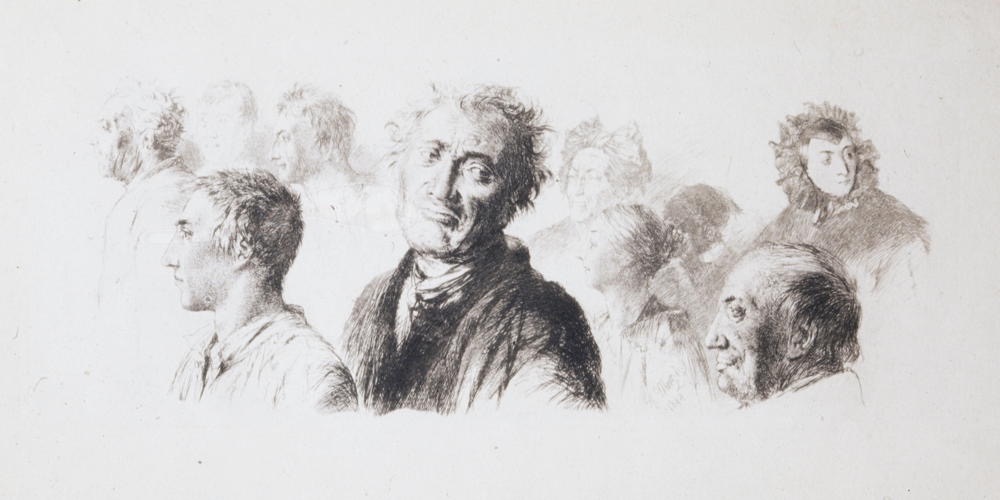
Adolph von Menzel:
Studies in the Insane Asylum (1844)
"We never know how to respond congruently."
Ordinarily, politics entails differences of opinion. It's different than this in the case of our current incumbent. There, realities seem to conflict. He and his minions deny the existence of verifiable conditions and assert the existence of clearly delusional ones. He exercises uninformed power. He primarily exercises non-existent powers. He proclaims stuff that could never be objectively excused as in any way related to truths. He holds convictions that only the more deluded conspiracy theorists ever seem convinced, then threatens and even exercises retribution against anyone disagreeing or, to use his words, "defying" him. Since when has a difference of opinion warranted such a response in this country that first championed freedom of speech, religion, and political conviction? Disagreement doesn't constitute a crime here. We have long revered dissent as one of the purest forms of patriotism, indeed nothing deserving any form of political retribution.
We teeter on an edge more perilous than mere politics.
WhollyUnlawful

Jean François Janinet: M. de Lafayette Arrests a Man for the Unlawful Hanging of a Thief (24 May 1790)
Book Title: Gravures Historiques des principaux événements depuis l'ouverture des Etats
[Historical Engravings of the main events since the opening of the States]
(1789?)
"Keep our Constitution out of the bedroom and the … board room out of our legislature … "
The Baby Boom Generation might have been the most scofflaw in history so far. We tended to obey the laws we agreed with and ignored those we didn't. Much of the difficulty might be reasonably assigned to a series of absolutely ridiculous laws, which, in my humbled opinion, attempted to legislate a particular morality, one not even a plurality of the polity ever really agreed to obey. We are much more pious publically than privately. We try to keep our immoralities off the front page of the papers. We figure it's nobody's business if we choose to smoke marijuana in the privacy of our home, even if, to enjoy that illegal liberty, we have to financially support the ever-burgeoning drug smuggling and distribution industry and all the greater sins that entails. We didn't imagine ourselves criminals but principled dissenters, the post-modern equivalent of Minute Men protesting against The Stamp Act. A whole array of such infractions riddled our modern society. Ever more, it seemed, as the more conservative came to dominate domestic politics. It should have been no surprise that Women's Rights were the most frequently, profoundly, and unjustly affected.
Eventually, one didn't need to smoke weed or develop an inflated sense of the personal rights bestowed by the Second Amendment to feel as though they righteously protested against a seemingly ever-more intrusive government.
TheBlues

Dodge Macknight: Blue Sky (19th-20th century)
"I had TheBlues so bad one time it turned my face into a permanent frown …"
Taj Mahal: "Cake Walk Into Town" from Recycling the Blues & Other Related Stuff
℗ 1972 Columbia Records, a division of Sony Music Entertainment
Released on: 1972-01-01
I live in such close proximity to ambiguity that it's a genuine wonder I can usually figure out what's happening around me. I can see out of The Villa's back second-story windows TheBlues rising to the east and south, the Blue Mountain foothills, that is. They represent a world of considerable wonder. In the summer, The Muse and I trundle up there to gather a sharp-scented local Black Current variation prized by The Nez Perce (Nimiipuu) tribe, TheBlues, comprising a significant portion of their homeland. In the spring, we enter seeking morels, a magical, almost mythical mushroom revered around here by both chefs and hillbillies. In winter, the snow crazy wend there way up into that country to ski, an activity that never made much sense to me, but God bless them, anyway. Last Fall, we stumbled upon a significant crop of wild huckleberries up there. Wildfires overran our favorite space during the teens; in our lifetime, it will never again be anything like it was. We still visit to reminisce and walk around in the remaining reassuring silence.
My ancestors crossed on The Oregon Trail, which passed a point I've not been able to locate, which they called The Top Of TheBlues.
InDEIcency

Hendrick Goltzius: Those who litigate must be shameless, patient and rich (1597)
Gallery Notes:
A litigating man (Litigator) walks up a staircase with two things in his hands and behind him three women carrying bags with the inscriptions 'Shamelessness', 'Patience' and 'Money' in Latin. Extensive caption in Dutch, German and Latin. This print is part of a series of eight prints about greed, deception and litigation.
——
" … we pride ourselves on being a decent people …"
Our current incumbent began waging a senseless war on decency from his first hour in office. He focused upon a modest-seeming target: recent attempts to codify decency into law. The overriding Law of Unintended Consequences might have gotten involved because quite a constituency had accreted around the idea that equality constituted an intolerable insult to the polity. They described it as Reverse Descrimination. From a zero-sum mindset, I suspect this logic might make close to perfect sense, for within that worldview, any gain by anyone else constitutes a loss for the home team. Consequently, they sense their historical and, therefore, sacred boundaries eroding. Further, such insistences become intolerable when any law commands that people treat everybody decently, for only some seem more deserving. Besides, the subtext screams that we were here first, so our rights and privileges must be superior, even though we don't believe we are in any way privileged.
The concept had been shorthanded into the label DEI, or Diversity, Equity, and Inclusion.
Weekly Writing Summary For The Week Ending 04/03/2025

Judith Rothschild: Untitled-
from Untitled portfolio of fifteen works by Judith Rothschild, Frank Bacher, and Sheri Martinelli (1946)
Why Should Any Of Us Be Any Different?
The turbulent end to this March and the even more turbulent beginning of April realized what had been prefacing since this incumbent took the oath he had no intention of fulfilling. The troubling story continues more or less unabated. When delusion got elected, our collective coping skills were called to kick in along with our harder-won hoping skills. Of course, this week also challenged our collective and individual abilities to hope, for the future looked progressively grimmer with each passing day. I continued writing, sharing my impressions. This morning, a neighbor stopped as she walked by out front, as I was saying goodbye to a visiting childhood friend, to report that she'd just survived a half-hour conversation with someone she felt sure was a Trumper. She was shocky. As I wrote this week, I reminded her that Rome wasn't undermined in a day. It wasn't built in a day, either. Little happens in a single day. However horrible events might seem on some of the more troubling days. Days decide nothing, though they can appear to undermine everything. That sense that all is lost must certainly be illusory. Even more illusory than that sense that our hope might be fruitless. I'm pleading for maintaing the quality of my experience at pretty much any cost, so I took some respite days and crawled around my yard preparing for Spring this week. Few things cannot be improved by crawling around a yard preparing for Spring. Spring comes regardless of our hopefulness to deliver reassurance not one of us was ever worthy of receiving. The Maribelle plum trees are blooming. The magenta ornamental crabapple is threatening to astound. Why should any of us be any different?
Power

Jan Asselijn: The Threatened Swan (c. 1650)
"Who went too far?"
Precisely because there's so very little to be gained, he engages in the game as if meant something. Sure, it's cruel; for some, that alone would constitute a more than adequate payoff. His thirst seems more of an unquenchable variety. His hunger was never once satisfied by merely consuming anything. Eating seems to sharpen his hunger, leaving him, if anything, even hungrier. He seems insatiable because he most likely is insatiable. Some mistake this for formidable, but it looks more like a vulnerability. He has no sense for enough. Adequacy evades his grasp. He demands excess in all things except moderation. Because he always goes big, he lacks strategic intent. He defaults rather than chooses. In the long run, he cannot conserve his resources. He believes himself all-powerful. This, of course, remains his greatest vulnerability.
Not everyone seems capable of wisely wielding Power.
Respite

Robert Capa: Wounded Loyalist Is Aided Behind The Lines, Spanish Civil War (1937)
" … must I remain on the ramparts as if my presence alone repels a disoriented and misguided aggressor?"
Even breaking news eventually grows old. The sense that my attention might be the only thing holding this increasingly fragile world together becomes self-destructive. Even though the battle, let alone any wider war, remains unfinished, my effectiveness diminishes. I realize it cannot be my calling to be always up to date with the latest developments. My media diet seems too anemic to maintain an adequate watch. I don't even subscribe to cable, and I cannot figure out how to access local television stations without The Muse's intervention. I get by with what I can stream, my local paper, which has a surprisingly effective editor, and the beleaguered NYTimes, my Washington Post sadly having recently disqualified itself. Much of what I can perceive from here appears to be feinting moves, stuff of little short or long-term consequence. It's helpful to understand that there is no master plan guiding these intrusions, and even if there were, those executing those plans seem incapable of following directions, even those painstakingly written with kindergarten crayons.
April came, dragging Spring behind her.
Forty-fourth

Harold Edgerton: Ouch! [Archery] (1934)
" … and I don’t think they can!"
I take a respite from my CHope series today to remember my remarkable daughter, born on this day forty-four years ago. She was not supposed to die before me, though she left me with occasionally overwhelming memories of her presence. I miss toodling into the Willamette Valley to spot newborn lambs with her. We were formidable lamb-lookers. I miss our long-searching conversations that always lead to revelations. My magic almost always worked with her. I won't forget our final conversation where she cried, revealing that the latest surgery had not relieved her symptoms or her often overwhelming pain. She fixed that herself in a meticulously planned and executed execution.
The searing superficiality of all our present incumbent engages with pales compared to a single genuinely significant life, like my darling daughter's.
Hubris

Anonymous, after print by Jean Veber: Schaduw van Paul Kruger hangt over het Franse leger tijdens de wapenschouw te Bétheny,
[Shadow of Paul Kruger hangs over the French army during the gun show in Bétheny] (1901)
Gallery Comment:
"This coat of arms of the French army was held on September 19, 1901 in Bétheny for Tsar Nicholas II. Paul Kruger was in Europe at the time, where he tried to recruit support for the struggle of the Boers in South Africa - especially from enemies of the United Kingdom, such as Russia and France. Print is part of a magazine with cartoons about the Second Boer War. With a three-line caption: Never has a cleaner army shown its strength more brilliantly… while such a clean use had to be made of it for the matter of law."
"They will exit on the same horse they rode in on."
Every civil society insists upon certain comportments. In Washington, DC, most government employees still wear formal business attire. It's unthinkable to go into the office in jeans. In Silicon Valley, a similarly enforced dress code focuses upon a more studiously casual style, just as religiously observed. There, it might be unthinkable not to go to the office in jeans. In the South, people still routinely address each other as "sir" and "madam," however backward that might seem. When I lived there, I quickly adapted to the local standard even though I'd previously thought myself too modern to so engage. I noticed the resulting gentility when people observed this practice and felt adequately cultured when I participated. Even though I'm re-ensconced back in the heathen north, I still observe this practice. It now seems like a matter of simple decency to me. If I had not been raised well, I managed to learn better.
There are likewise comportments that never seem to contribute anything positive.
WitchHunting

Jean Veber: Witches (1900)
"All accusations to the contrary qualify as WitchHunting."
Even wannabe dictators must learn to spend much of their time in denial, for they become a magnet attracting outrageous accusations. Not that most of them aren't true, but it just would not do to confess to what he's actually up to. Aspiring dictators must uphold certain standards, and truthfulness is, frankly, somebody else's purview. Truth and fiction must become indistinguishable, requiring at least daily denial. News conferences almost always feature the incumbent awkwardly admitting something by vehemently denying it. The assembled journalists and even the press secretary understand the ritual, and few even attempt to deliver a killer follow-up after their original question gets rudely blown off. The palpable fictional content of the denial hangs in the air for a while like smoke obscuring mirrors. He insists they've only uncovered another Witch Hunt, which everyone understands does nothing but confirm the absolute truth of the original statement.
It might help the eroding credibility if he could vary the terms he employs to describe the situation.
ChangingThePast

Mel Bochner: If the Color Changes [MB2042] (2001)
© Mel Bochner
"They toil to expunge themselves. Good riddance!"
Unable to positively change any future, repressive regimes quickly turn their attention to ChangingThePast. This amounts to an impossible objective, though the native impossibility of it won't halt or even meaningfully retard their effort, for outrunning an unsavory past seems imperative if the repressive regime is to gain any respectability. If they can whitewash history, they might stand a chance to reprogram memories. This could result in a sort of forced respectability that repressive regimes always seek. They want to be seen as in favor of mom and apple pie rather than bloody labor strife and Jim Crow Laws. If they are nothing, they are deep-down hypocrites. They desperately want to forget whatever might tarnish their reputation and, their reputation being less than reputable, requires some extraordinary reengineering. They focus on repressing books because they're an easy and reliable target. Not that many of their supporters read all that many books. They've always sown deep suspicions that readers are progressives. They slur other publications and their publishers. Suppose The New York Times publishes a highly-regarded series that turns into a book and a Netflix series tracing the real history of African Americans. In that case, everyone involved gets labeled as "woke." Pure public relations genius soon rebrands "woke" from meaning a form of insightful wisdom to meaning a means for demeaning white people. Wokeness becomes public enemy number one.
Repressive regimes seem uninterested in any distinction between truth and fiction.
Weekly Writing Summary For The Week Ending 03/27/2025
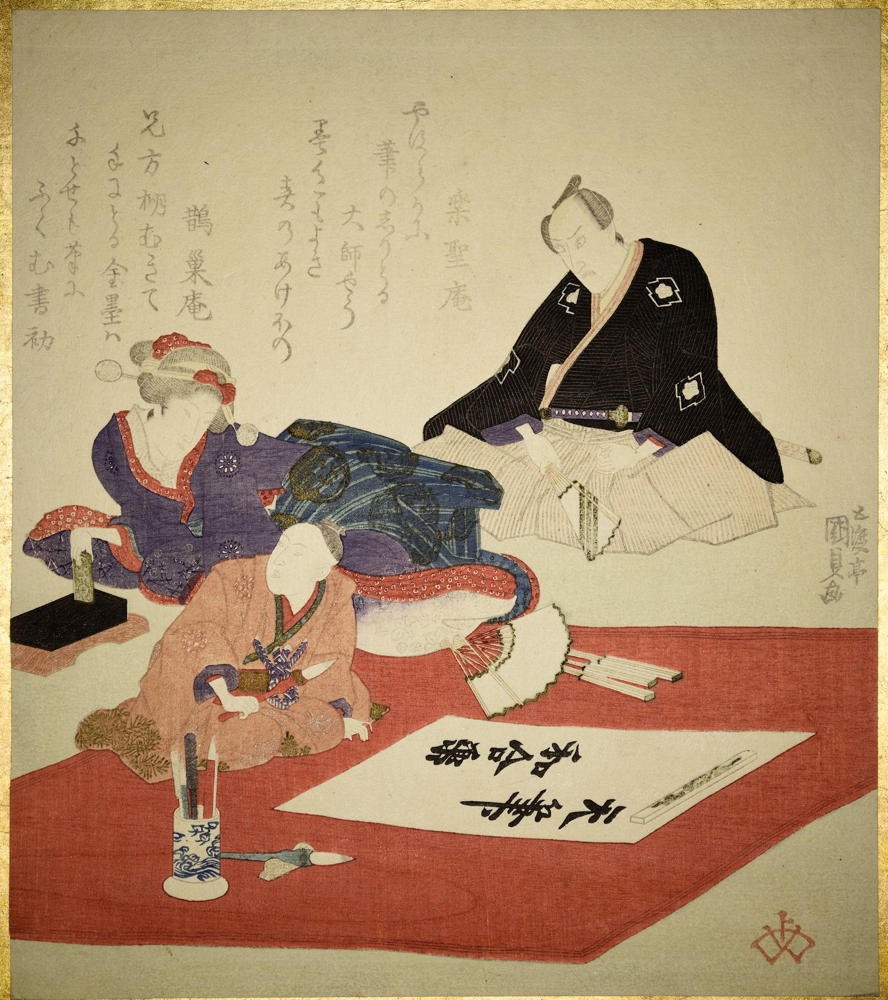
Kunisada Utagawa: Writing examination (1810 - 1830)
Just Trending Toward Something
If I'm witnessing a revolution, it certainly seems to be an awfully ham-handed one. I'm reminded of how a gorilla might go about disassembling something he doesn't understand. He resorts to muted brute force, not knowing what might cause the thing to open. He dents the case and ultimately gets defeated by tiny screws, the operation of which seems too subtle for him to comprehend. Almost every move has been thwarted by the courts. Appeals have likewise proven fruitless. Chaos has resulted. I won't argue that chaos doesn't produce its own effects, though they tend to be something other than structural. They might even create a more substantial structure than it attempted to threaten. As chilling as many of the initiatives have seemed, they sum to deeply superficial, perhaps because they're inspired by science fiction. They rely upon non-existent principles and properties. They profoundly misunderstand human nature.
PennyWisdom
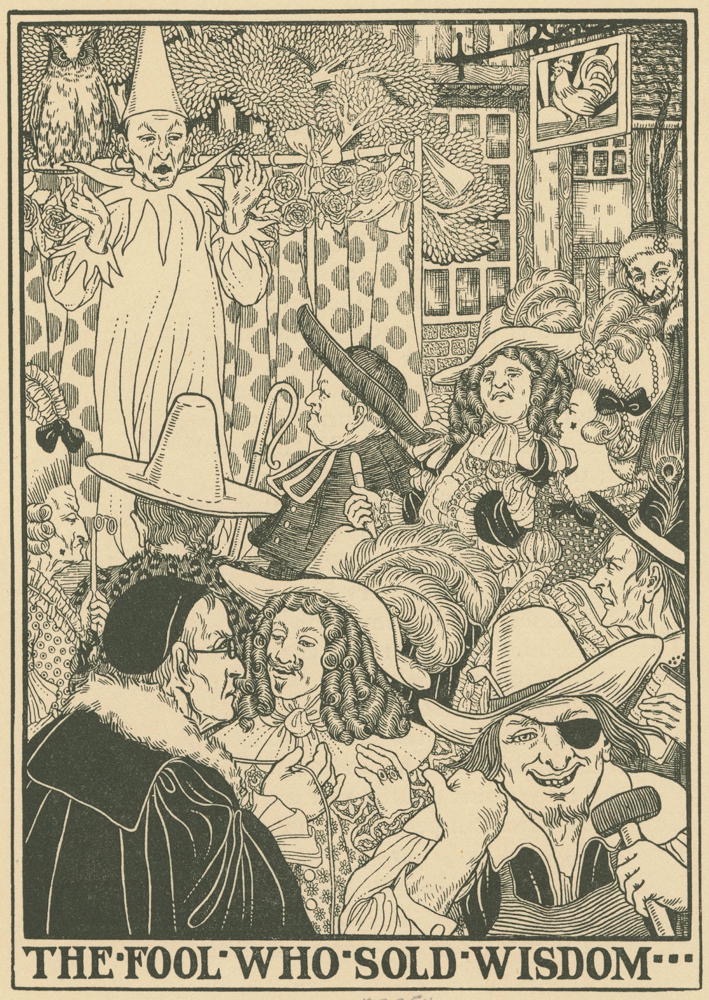
Percy Billinghurst: The fool who sold wisdom. (1900)
"I wonder how our public purse might be influenced
if our billionaire benefactors had ever learned to play Find A Penny, Pick It Up."
The recent injection of multitudes of billionaires into positions affecting the public purse has provided an opportunity to understand better how the very wealthy relate to money. I, the son of parents who grew up through the Great Depression, inherited certain beliefs and practices regarding money. I believe that money is almost impossible to acquire. This belief encourages me to be stingy. I do not seek luxury. I prefer good enough over perfect. I understand that everything costs money and that, mostly, the amount of money stuff costs cannot be meaningfully reduced. Attempting to reduce the cost associated with basic living tends to increase that cost. Trying to eliminate that cost almost always creates catastrophe; the absence of such expenses produces genuine calamity that will cost multiples of whatever was supposed to be saved to recover. I try to be satisfied with what I have, understanding that it's always possible to spend a lot more without gaining an ounce of additional satisfaction. Get-rich-quick schemes tend to be the best way to get poorer quickly.
BIllionaires seem to believe that a penny not spent is a penny somehow liberated from a form of slavery.
Equivocal

Alfred Stieglitz: Equivalent, Spiritual America (1923)
"The reigning forces of darkness have no idea what they've inspired."
They lie so reflexively it remains impossible to see any shred of truth in their responses. They know that you know, too. It's as if they're chiding you, urging you to go ahead and try to get even. Impunity never imagined a better friend. And they're right for the moment. In that instant, there couldn't possibly be any leveling of that playing field. The whole game seems to belong to Simon Legree's team. The umpires are crooked. The fans, divided. Even the future of the game appears undecided. What was once considered The Great American Pastime no longer means anything to anybody. It's become a medium for domination to a few and the absolute symbol of subjugation to a fast-growing majority. This situation will turn, but not immediately, and certainly not without considerably more discomfort. Until then, the lies will continue unabated as if winning those little controversies mattered, and the liars will continue enjoying the only notoriety they will ever see. They're each set on a course toward infamy.
Philosophers might insist that every human action might as well be considered ambiguous.
Insecure

Attributed to Giuseppe Maria Crespi:
Woman Looking For Fleas (c. 1715)
" … the one true sign of their underlying cowardice!"
Security was never gonna be this administration that can't administer anything's strong suit. If loose lips did sink ships, we'd be down a few battle cruisers after only two months with "him" in office. Fortunately, most breaches go unnoticed by allies and enemies. The most damaging ones live on to become exemplars of an administration's performance, bloopers that lived on to become definingly infamous. The amateurs employed by this operation ensured a day like yesterday would eventually come around, where a group of senior officials engaged in top-secret government business on an insecure private network with an inadvertently invited journalist listening in. This arrangement violated more laws than it respected, though few doubt that what it represented has been a typical scenario since this incumbent took office. I know from a recent conversation with an old friend who works at the USDA that they, too, communicate via Signal, though that violates multiple communication preservation and security protocols. It should surprise nobody that this incumbent, who scoffs at almost everything, also routinely scoffs at security laws.
When confronted with the evidence of this egregious security breach, our new Secretary of Defense (SecDeaf) responded by screaming at the questioning reporter, thoughtfully channeling his emotional age as if anybody was likely to guess differently.
Extortion
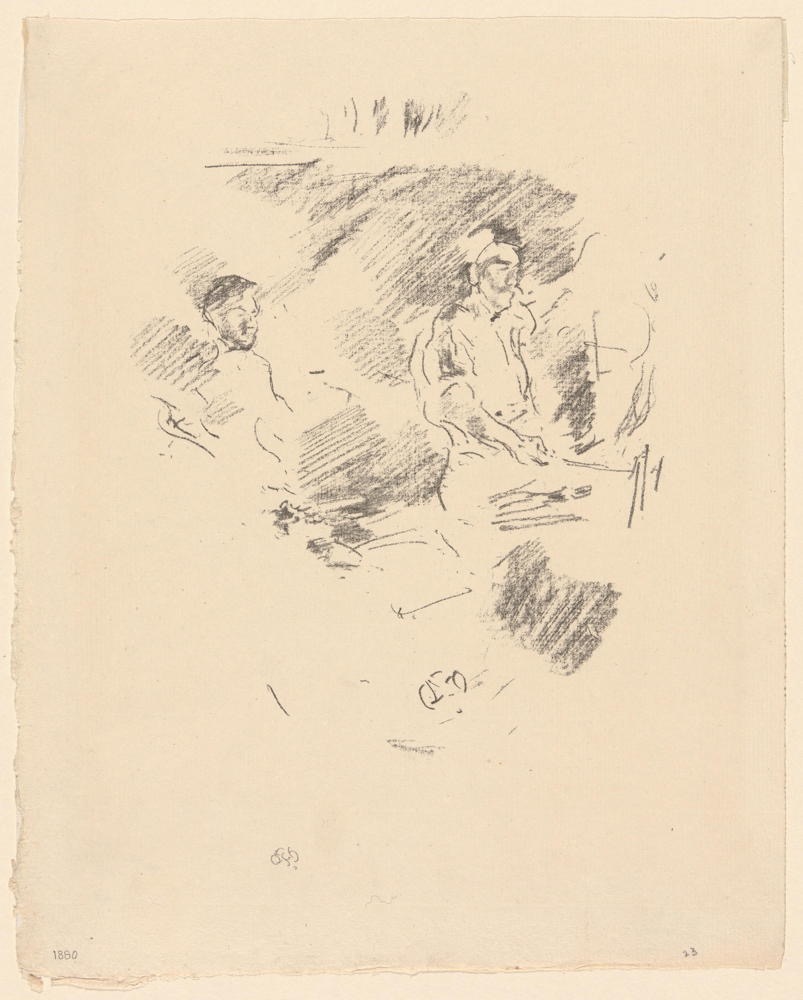
James McNeill Whistler: The Strong Arm (1895)
"Congratulations, or something. Such are the wages Extortionists always earn."
Nothing better evidences the weakness of this new administration that can't seem to administer anything than that they resort to bullying instead of convincing. Honest politicians exercise the considerable art of forging such deals, persuading, horse-trading, and working for agreement with the implicit acknowledgment that whatever's decided won't hang together long without voluntary acceptance. Governing demands the consent of the governed, as every failed authoritarian can readily testify. They thought it might be somehow simpler to strong-arm their way toward acquiescence, and in the extremely short run, such tactics might even seem to succeed, but no allies get created when inflicting such decisions. Quite the opposite. With each so-called success, the number of detractors grows until no supporters are left. It matters how treaties emerge.
It feels no less terrifying to understand that the assault comes as a result of their weakness.
MessSitting

Jack Gould: Untitled [mess on floor of ruined apartment] (1955)
"I'm first coping with the underlying nature of the difficulty."
Last night, for the second night in a row, The Muse and I had been invited out to engage in another dialogue. Neither engagement was intended to fix anything, but each was more focused on better understanding the nature of the difficulties or what fixing might entail. We might have wondered what we'd gain from engaging in conversations while Rome burns, except our experience strongly suggested that failing to engage in precisely such conversations might be the leading cause of failures when attempting to extinguish fires. It's all too easy to run into the burning building armed with little more than the best intentions, only to discover some hidden nature of the fire after entering. Under the Measure Twice Before Cutting Rule, it's often proved better to engage in some aimless conversation before acting to resolve a situation, however urgent it seems. It might even be that the more urgent a response appears, the more necessary the preceding conversation. Improving focus or understanding might better target a response.
This always seems like wasted time.
CHope
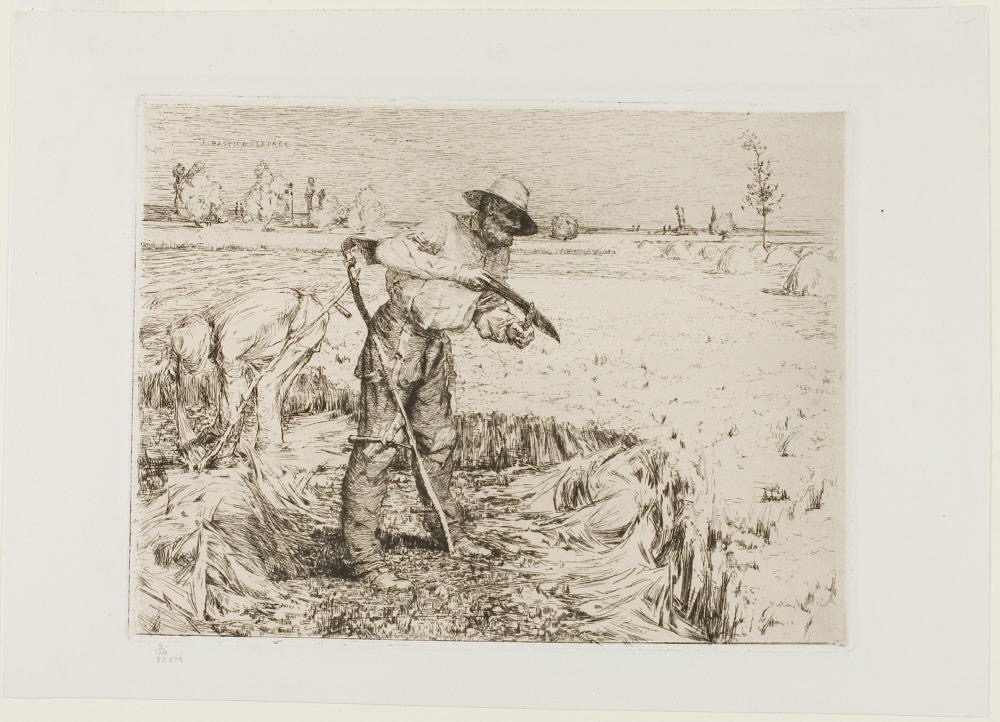
Jules Bastien-Lepage: Mower Honing a Scythe (1878)
" … and to radiate enough hope to make however I cope feel worthwhile."
Over recent months, my MacBook Air started crashing each morning. Because I became a compulsive saver, I rarely lost anything in these crashes. They became annoying, usually happening at one of the more inconvenient times. I'd be rushing to finish posting my daily story when everything would freeze up, and I'd have to begin that familiar recovery routine. We all know how rebooting under such conditions seems to take a little longer than forever. I'd recover and then finish my business feeling persecuted rather than elated. On a recent trip to Portland, I resolved to buy a new MacBook. I'd diagnosed the crashing difficulty as being caused by insufficient memory. I'd learned that my current machine already has all the memory it can handle, so I reasoned that I needed a new machine. The Apple Store was its usual minimalist purgatory overrun with potential customers. I managed to catch the attention of a representative after spending fifteen or twenty minutes poking at sample display machines. I'd decided what I needed but quickly learned they didn't have what I wanted. I was advised I could order one online but cautioned that the low inventory probably meant some newer models were imminent. I left with a pocketful of complications, knowing that I would not run home and purchase a new machine online.
I started coping better with my situation instead.


